














New farmers break barriers to land ownership


Volume 83, Number 3
September 2024
Virginia Farm Bureau News (USPS 017763) (ISSN 1525-528X) is published four times a year. January, April, September, November. It is published by Virginia Farm Bureau Federation, 12580 West Creek Parkway, Richmond, VA 23238. Periodicals postage rate is paid at Richmond, VA and additional mailing offices. The annual Subscription Rate is $1.13 (included in membership dues).
Postmaster: Please send changes of address to, Virginia Farm Bureau Federation, Farm Bureau News, P.O. Box 27552, Richmond, VA 23261-7552; fax 804-290-1096. Editorial and business offices are located at 12580 West Creek Parkway, Richmond, VA 23238. Telephone 804-290-1000, fax 804-290-1096. Email virginiafarmbureaunews@vafb.com. Office hours are 8 a.m. to 4:30 p.m., Monday through Friday.
Members — Address change? If your address or phone number has changed, or is about to change, contact your county Farm Bureau. They will update your membership and subscription information.

















“We don’t have that war chest of generational farming.”
— AUSTIN M c NETT , Augusta County farmer
Producer members will receive their next issue of Virginia Farm Bureau News in November. The magazine is published quarterly, and back issues can be viewed at issuu. com/virginiafarmbureau
All advertising is accepted subject to the publisher’s approval. Advertisers must assume liability for the content of their advertising. The publisher assumes no liability for products or services advertised. The publisher maintains the right to cancel advertising for nonpayment or reader complaints about services or products.
Member: Virginia Press Association
EDITORIAL TEAM
Pam Wiley Vice President, Communications
Kathy Dixon Managing Editor
Nicole Zema Sr. Staff Writer/Photographer
Christina Amano Dolan Staff Writer/ Photographer
Kenny Kane Graphic Design Manager
Eleanor Stickley Sr. Graphic Designer
Alice Kemp Sr. Staff Writer/Advertising Coordinator
VIRGINIA FARM BUREAU FEDERATION Officers
Wayne F. Pryor, President
Scott E. Sink, Vice President
Board of Directors
DIRECTOR DISTRICT COUNTY
Emily F. Edmondson 1 Tazewell
Richard L. Sutherland 2 Grayson
Bruce N. Stanger 3 Montgomery
Jeannie L. Dudding 4 Craig
Russell L. Williams II 5 Rockbridge
Justin Pence 6 Shenandoah
Thomas E. Graves 7 Orange




Leigh H. Pemberton 8 Hanover
William F. Osl Jr. 9 Cumberland
Robert J. Mills Jr. 10 Pittsylvania
J. M. Jenkins Jr. 11 Lunenburg
J. Barry Bates 12 Essex
Gary D. Cross 13 Southampton
David L. Hickman 14 Accomack
A. Faye Hundley * Essex
Michelle Fox ** Tazewell
*Women’s Committee Chairman
**Young Farmers Committee Chairman WE’RE
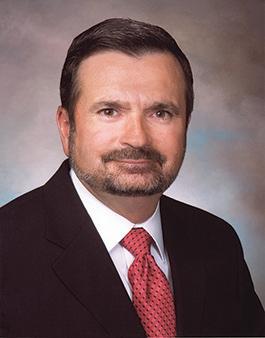
Between the 2017 U.S. Census of Agriculture and the 2022 census—results of which were released earlier this year— the country has lost 20.1 million acres of farmland. That’s three times all the farmland in Virginia, and an area about the size of Maine!
That’s a lot of land to take out of production in such a short period of time, and I am really concerned.
Remember when COVID 19 hit, and we experienced empty grocery store shelves for the first time in our lives? Well, if farmers lose the land on which they’re producing our food and fiber, those empty shelves could return.
Right here in Virginia, we lost nearly 500,000 acres of farmland between 2017 and 2022. What will that look like in another 50 years?
According to the state Office of Farmland Preservation, farmland loss is caused by increasing commercial and residential development, particularly from urban and suburban creep surrounding established urban centers. Non-residential development like utility-scale solar facilities—a fast-growing industry in Virginia— also contributes, as these facilities use large amounts of land typically found in rural areas.
The report added that the decreasing amount of farmland has the potential to adversely impact the agricultural industry and Virginia’s economy since agriculture is the state’s largest economic driver. Additionally, the loss increases fragmentation of remaining farmland and escalates land prices for farmers.
Farmland is a finite resource. Once it’s lost to development, it will be very difficult, if not impossible, to transition the land back into agricultural production. I’m in favor of private property rights and people being allowed to make decisions about their land. And I’m not against housing, roads or even solar development—but I am if they’re taking away prime farmland.
Farmers have been able to increase productivity on fewer acres using technological advancements. However, demand for food and fiber is everincreasing. The U.S. population has more than doubled since 1950, rising from 159 million in 1950 to 340 million in 2023. The global population more than tripled, increasing from 2.5 billion to 8 billion during the same period.
The United Nations projects that the world population will reach 9.7 billion by 2050. As populations grow, the need for more agricultural production increases with them.
Farmers are resilient, but the loss of farmland, combined with lower profit margins and high production expenses like equipment, feed, crop inputs, supply costs and labor, has caused farmers to question their economic viability— particularly among small and midsize farms.
We need our farmers, we need our food, and we need our farmland.
Wayne
F. Pryor, a Goochland County hay and grain producer, is president of Virginia Farm Bureau Federation.
as of August 15*
*Membership year ends Oct. 31, 2024.
Featured this month on Real Virginia, Virginia Farm Bureau’s weekly television program:
• Learn how growers transport their behemoth produce to compete in the State Fair of Virginia’s Giant Veggie Weigh-Off.
• Find out how the Southside Virginia Fruit and Vegetable Producers Association is expanding to better serve its farmers.
• Discover how artificial intelligence can help farmers work more efficiently.
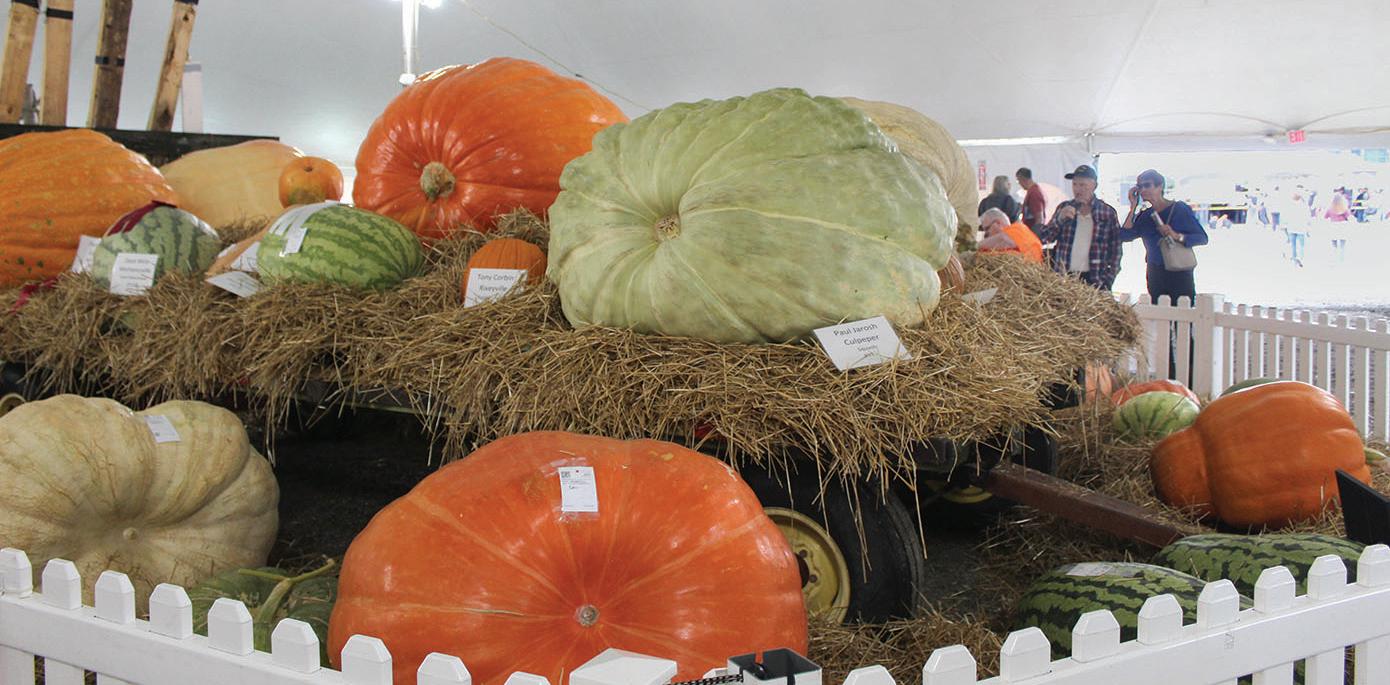
The Virginia Farm Bureau Federation Women’s Leadership Committee is accepting entries for its popular Hay Bale Decorating Contest through Nov. 15.
Now in its 10th year, the fun, creative competition is open to county Farm Bureaus, businesses, schools, student groups, community associations, individuals and others. Guidelines and an entry form are available at vafb.com/ womensleadership.
Competitors can use round or square bales and other agricultural items to create animals, structures, shapes and farmscapes. Participants are asked to submit photos of their displays with their applications.
Winning decorators will receive a cash award in the following categories: junior (8 and younger); square bale display; community spirit; and most creative. Also returning this year is the themed category, “Stars of Agriculture,” in which participants are invited to decorate hay bales like a celebrity or agricultural figure—real or fictional.
Winners will be notified by email or phone. Hay bale photo entries will be displayed at the VFBF Annual Convention in Hot Springs in December.
Real Virginia airs nationwide at 5 p.m. on the first and third Saturdays of each month in the Voices of Agriculture program on RFD-TV on Dish Network and DirecTV, and on selected cable outlets around the state. It airs weekly on WBRA digital channel 15.2, the WHRO World Channel, WVVA Bluefield and WTKR Norfolk, and on the first and third Sundays of each month at 10 a.m. on WVIR Charlottesville and at 10:30 a.m. on WHSV Harrisonburg; and on the first and third Saturdays at 8 a.m. on WRLH Richmond and at 5:30 a.m. on WSLS Roanoke.

53 MILLION




That’s how many U.S. adults suffer from arthritis, according to the Centers for Disease Control and Prevention. The disease affects one in five Americans and one in three farmers. Some reports say 30% of Virginia farmers are affected by arthritis, usually osteoarthritis. Seerelatedarticleonpage31.



Celebrate the best of what’s grown, made and raised in the commonwealth during the State Fair of Virginia Sept. 27 through Oct. 6 at The Meadow Event Park in Caroline County
New and returning attractions include lawnmower racing, the Strolling Piano, Doc Belmont's Magnificent Magical Medicine Show, Alpaca Days, Rosaire’s Royal Racers, Triple Crown Circus and more. The Main Stage Concert Series will feature a variety of performances across several musical genres.
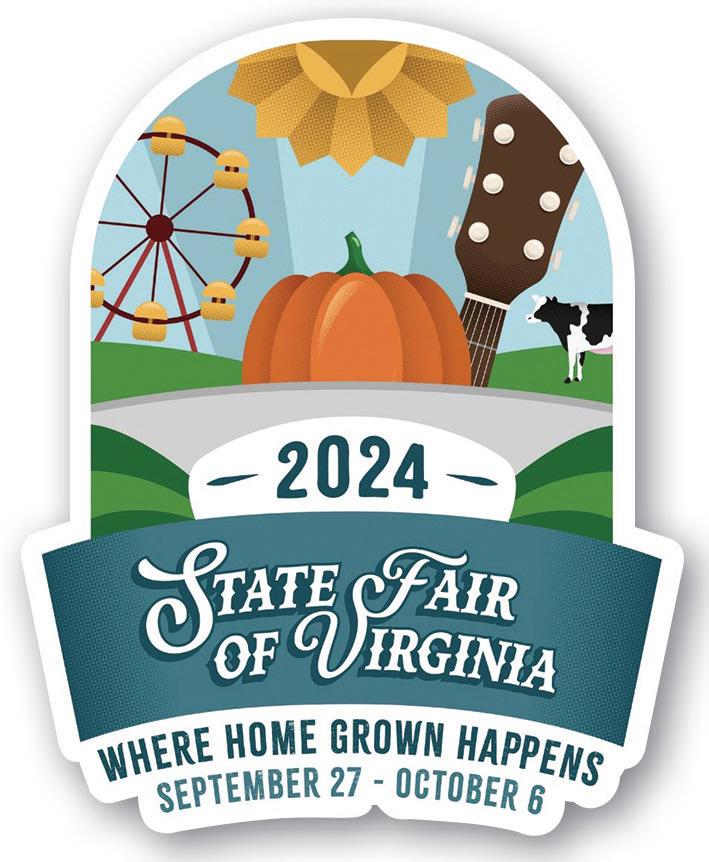

The Black Tie & Boots Gala returns to Meadow Hall on Sept. 27, and the Second Annual Taste of Virginia on Oct. 3 offers tastings of some of Virginia’s finest foods and beverages. Proceeds from both benefit fair scholarships and youth programming.
For a complete list of attractions, events, performers and other details, visit StateFairVa.org.
Farm Bureau members are treated to a $5 discount off regular admission price on any day of the fair using the Member Deals Plus® app. Visit StateFairVa.org/ p/about/ticket-info-and-hours for redemption instructions. The limit is two discounts per membership.



The 2024 Virginia Farm Bureau® Federation Annual Convention will be held Dec. 2-5 at The Omni Homestead Resort in Hot Springs.
With over 250 years of history, ‘America’s first resort’ recently underwent a $150 million renovation to restore the property’s grandeur. Incorporating a fresh approach while preserving the resort’s vintage style, the improvements encompassed all guest rooms, public spaces and meeting rooms, as well as the theater, market and legendary Warm Springs Pools.
Highlighting the theme “Cultivating Connections,” the convention is open to all county Farm Bureau members, staff and any member of the public interested in learning more about Virginia agriculture. Registration for lodging and meals is now open for county Farm Bureaus and will close on Oct. 29.
The convention will host Lisa Smartt, humorist and motivational speaker, during the Fellowship Luncheon, along with other invited guest speakers. An author and columnist, Smartt loves sharing her personal weaknesses, struggles and joys of daily living with others.
The agenda also will include important legislative updates, policy discussions, workshops and a voting delegate orientation.
Delegates certified from each county Farm Bureau will establish VFBF state and federal policies for the coming year, and vote for president, vice president, Women’s Leadership Committee chair, Young Farmers Committee chair and directors representing Districts 2, 5, 8, 11 and 14.
Judging will take place for the Young Farmers Discussion Meet and the Virginia Foundation for Agriculture, Innovation and Rural Sustainability’s Agricultural and Forestry Innovation “Bull Pen” Challenge. Winners will be announced during the convention.
Additionally, winners will be recognized for the 2024 VFBF County Farm Bureau Awards of Excellence and the 2024 VFBF Journalism Awards.
Affinity Cellular offers a wide array of plans and phones with a focus on talk and text only, with lower data consumption. You select the phone and plan that best fit your needs!
Virginia Farm Bureau members enjoy exclusive benefits, including a $75 airtime credit, free activation ($35 value) and free shipping. Members have the option to keep their current phones (subject to network compatibility), select from the latest iPhone or Android devices, or choose a simple flip phone. They also may keep their existing cell phone numbers.
To set up a plan with Affinity Cellular, visit vafb.com/benefits, log in as a Virginia Farm Bureau member, and go to the Affinity Cellular tab.
Virginia Farm Bureau members receive a 15% discount off best available rates at Drury Hotels, where extras aren't extra.
The discount is valid at more than 150 Drury Hotels locations in 26 states, including one in Richmond. See a full list of locations at druryhotels.com/locations
All overnight guests will enjoy free hot breakfast; free 5:30-7 p.m. appetizers and cold beverages; free internet access; and free stays for kids in their parents’ room.
To make a reservation, visit vafb.com/ benefits, log into your account, and go to the Drury Hotels tab. The corporate code should populate automatically.
*Discount subject to availability and cannot be used with other discounts, offers or promotions. Discounts cannot be used with other programs. Advance reservations are required, and blackout dates apply!
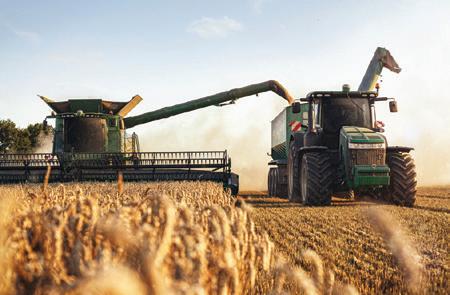

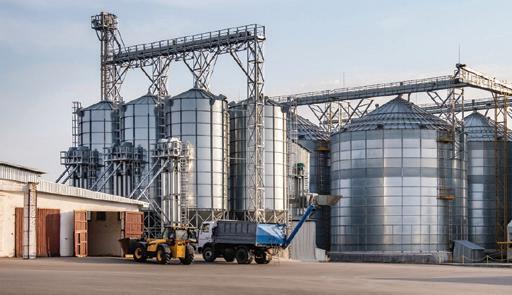
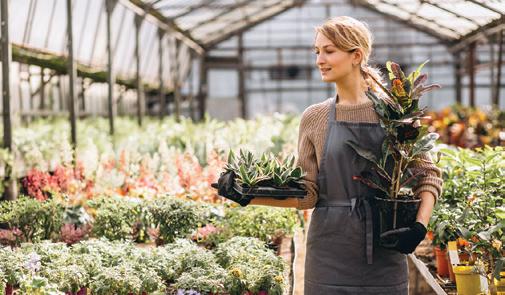

Apparel saves members up to 20% off, plus free shipping
Since 1908, KEY Apparel has crafted quality workwear at an affordable price.
Virginia Farm Bureau members will receive a 10%-20% discount on all merchandise, plus free shipping on orders over $75. Members can customize garments with state or county Farm Bureau logos, or add personal graphics like sports team and organizational logos.
To use this Virginia Farm Bureau benefit, visit vafb.com/benefits, log in as a Virginia Farm Bureau member, and go to the KEY Apparel tab and follow the link to Virginia’s exclusive site.




*Visit FordRecognizesU.com/ FarmBureau today for complete offer details!


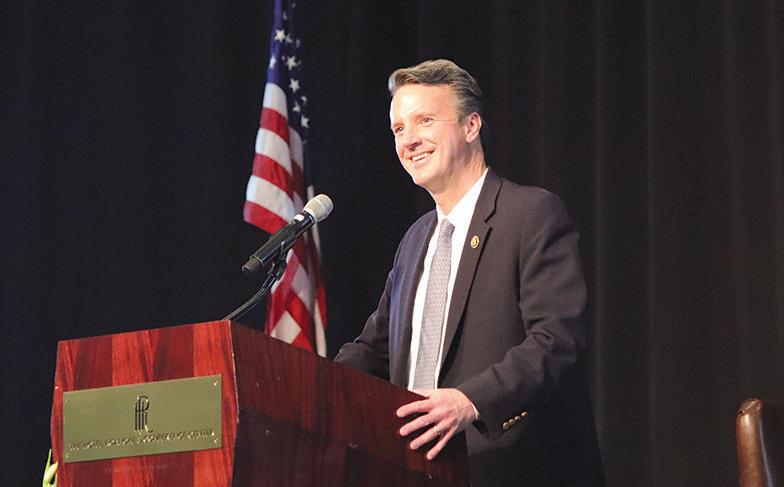

ARTICLE AND PHOTOS
BY ALICE KEMP & NICOLE ZEMA
Following the theme “Stars of Agriculture: Farm Bureau Women Shine,” the 2024 Virginia Farm Bureau Federation Women’s Leadership Conference was a celebration of accomplishments in agriculture and within Farm Bureau.
Through grassroots advocacy, educating lawmakers, fundraising, community service and sharing their agriculture stories, Farm Bureau women exemplify what it means to be leaders.
“The stars are sitting in this room,” said VFBF President Wayne F. Pryor. “All of you shine. Farm Bureau would not be what it is without you.”
Jessica M. Jones was named VFBF Distinguished Farm Bureau Woman.
The award recognizes agricultural leadership and contributions to a farm business or agricultural enterprise.
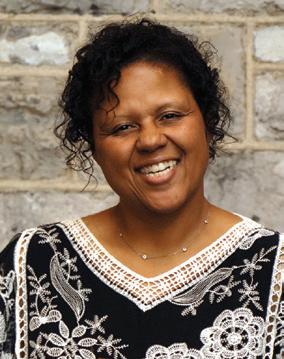
The Pittsylvania County educator has taught agriculture and served as FFA advisor in several Virginia schools. Currently, she teaches at Tunstall High School and is a professor of agribusiness, communications and leadership at the University of Mount Olive in North Carolina.


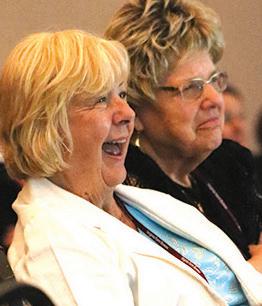
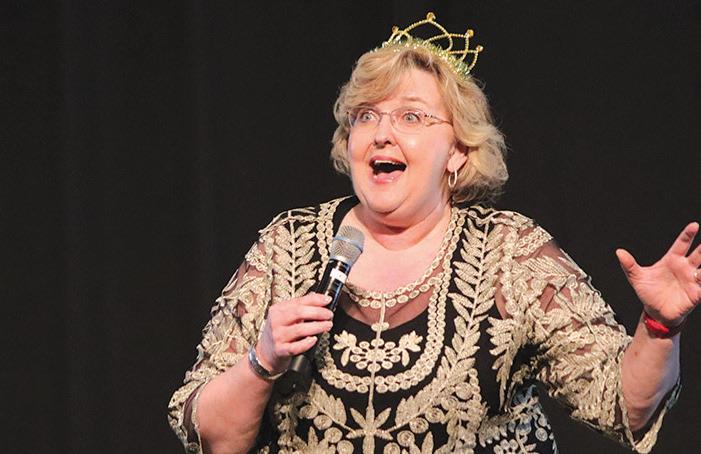

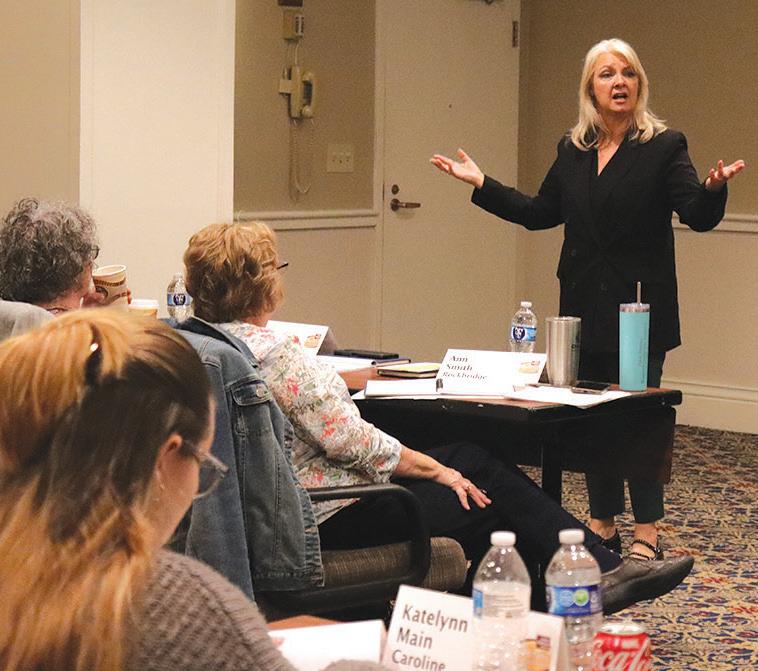
Appointed by former Gov. Robert McDonnell and reappointed by Gov. Glenn Youngkin, Jones is a milk commissioner for the Virginia Department of Agriculture and Consumer Services. She is the superintendent's Region VI representative and president and chair of the Advisory Board for Teacher Education and Licensure to the Virginia Board of Education.
and Farm Bureau.
A former Virginia FFA state vice president, Martz plans to pursue a degree in agricultural education at Virginia Tech. Her platform identifies goals to share agriculture’s story with schoolchildren among their core classroom subjects.
Coffee was a member of the Lunenburg County Farm Bureau Women’s Committee for over 40 years and served as District 11 chair on the state committee. She founded W.J. Coffee Farms with her husband, William, and together they served on the VFBF Young Farmers Committee. In 1988 they were named the VFBF Young Farmers of the Year, and in 1999 Coffee was named VFBF Farm Woman of the Year. She was appointed by multiple Virginia governors to serve on the Virginia Agricultural Council.
Workshops enlighten, inform
Attendees honed their skills through a variety of workshops. Topics included farm succession planning; cybersecurity; Agriculture in the Classroom toolkits; the Farm Credit Knowledge Center; social media marketing; and Farm Bureau member benefits.
Louisa County veterinarian Dr. Melinda McCall led a workshop about tactfully speaking with community members about the food supply and how to dispel common agriculture misconceptions.
Speaker emphasized owning the narrative
The keynote speaker was 2023 Miss Virginia Katie Rose, who shared her powerful story of surviving sexual assault and domestic violence, leading a life of empowerment and never giving up.
“What kept me going was continuing to be the best version of myself, put my best foot forward and accomplish my dreams,” Rose shared. “I learned how to come back after being told no.”

Anne Kathryn Martz of Essex County was named 2024 VFBF Ambassador. The program recognizes young adults for agricultural achievements and provides opportunities to serve as spokespersons for agriculture
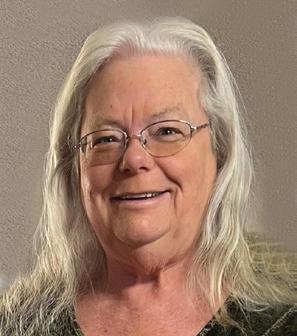
The late Kathy Coffee was remembered for her contributions to Farm Bureau and agriculture. She was posthumously recognized as Outstanding Woman in Agriculture during VFBF’s 2023 annual convention.
This spring, VFBF Women planted a dogwood tree in Coffee’s memory at her family’s farm in Kenbridge.
During a chat with VFBF Women’s chair Faye Hundley, Rose encouraged Farm Bureau women to seek opportunities to own agriculture’s story.
“Look at what’s already being said because we can change the narrative,” she remarked.
The 2025 Women’s Leadership Conference will be held April 3-6 at The Hilton Richmond Hotel & Spa in Short Pump, Henrico County.
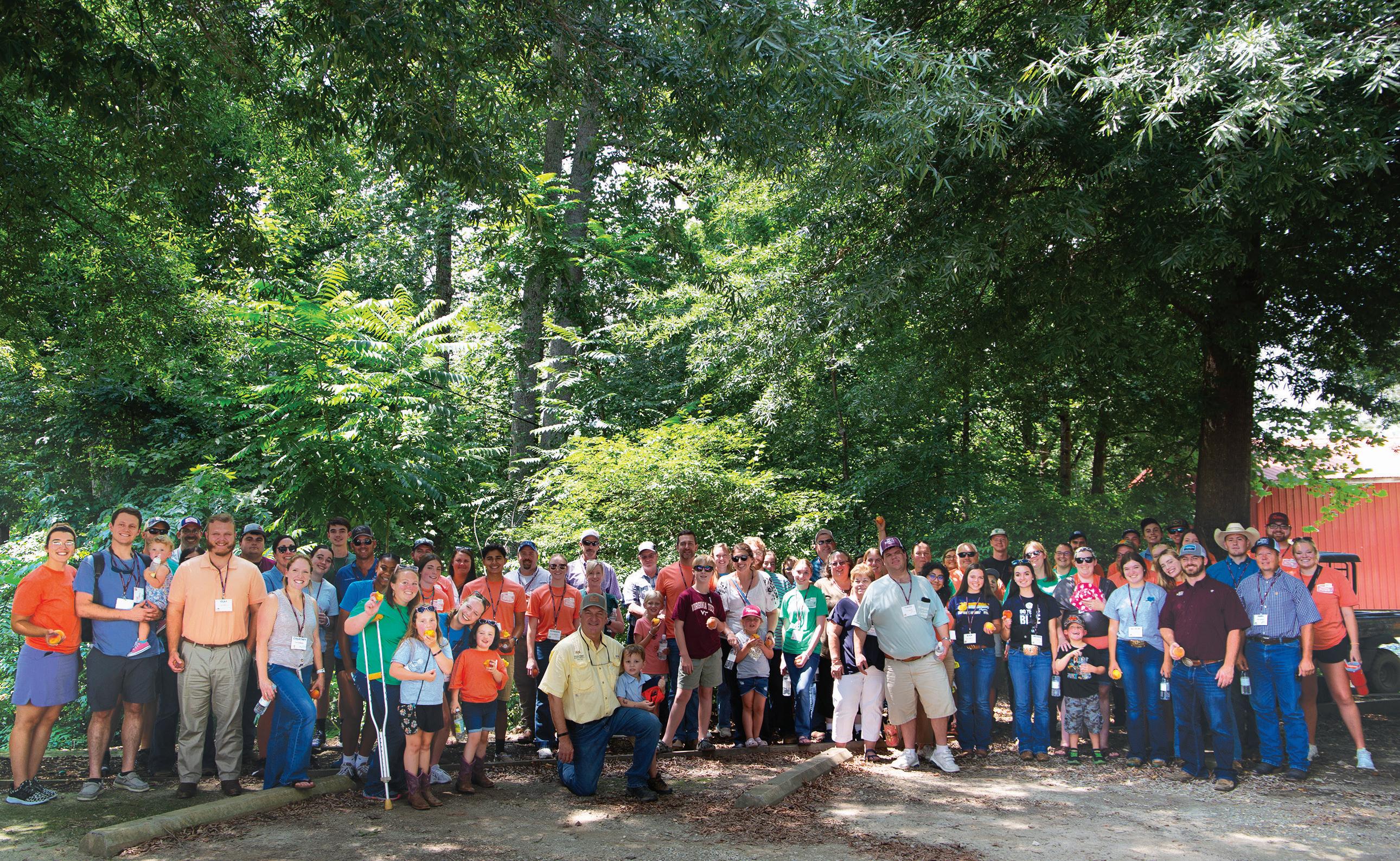

ARTICLE AND
BY CHRISTINA AMANO DOLAN
About 220 young farmers from across Virginia flocked to Nelson County July 26-28 for the 2024 Virginia Farm Bureau Federation Young Farmers Summer Expo
Themed “Farm Life is Just Peachy,” the event emphasized the importance of preparing for the what-ifs in one of the most fruitful—yet most dangerous—occupations.
The expo’s keynote speaker was Katie Hammock, an emergency room nurse and dairy farmer’s wife who spoke of her passion for farm safety awareness.
“My goal is for you to have the tools and resources to know what to do when that worst situation happens, because unfortunately it happens too often,” she said.
About 500 people nationally lose their lives every year in farm accidents.
Hammock urged farmers to always keep a tourniquet, a blood-clotting
product like QuikClot®, sterile bandage rolls such as Kerlix™, a CPR shield and a whistle nearby; and ensure others are always aware of your location.
Curt Porterfield, training programs coordinator for Virginia Tech Environmental Health & Safety, emphasized the importance of preparation in securing the industry’s future during an all-terrain vehicle safety workshop.
While 60% of the 100,000 ATVrelated injuries each year are from agricultural use, farmers make up only 3% of the U.S. population.
“When we lose a farmer, that’s tough on our industry,” Porterfield noted. “You’ve got to protect that 3%.”
Young farmers also learned how to build their businesses, secure health insurance, and improve their communications with legislators.
Tours to area farming operations, including Saunders Brothers, Seaman’s Orchard and Deep Roots Milling, offered participants a glimpse of the area’s diverse agricultural landscape.

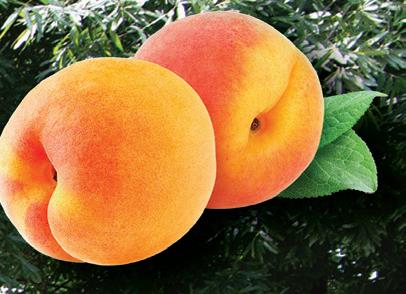

“You get a little taste of Virginia all in one county,” said Benjamin Karnes, a Louisa County young farmer.
Winners of three annual awards were announced during Saturday night’s dinner at Wood Ridge Farm Brewery in Lovingston.
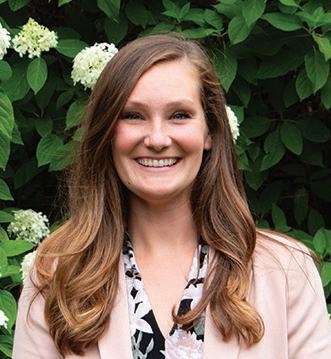
Morgan Slaven of Augusta County was named the 2024 VFBF Young Farmers Excellence in Agriculture Award winner. The award recognizes involvement in agriculture, leadership ability and participation in Farm Bureau and other organizations. Slaven has served as an agricultural advocate, including in her current role as manager of governance and executive affairs for Shenandoah Valley Electric Cooperative. She
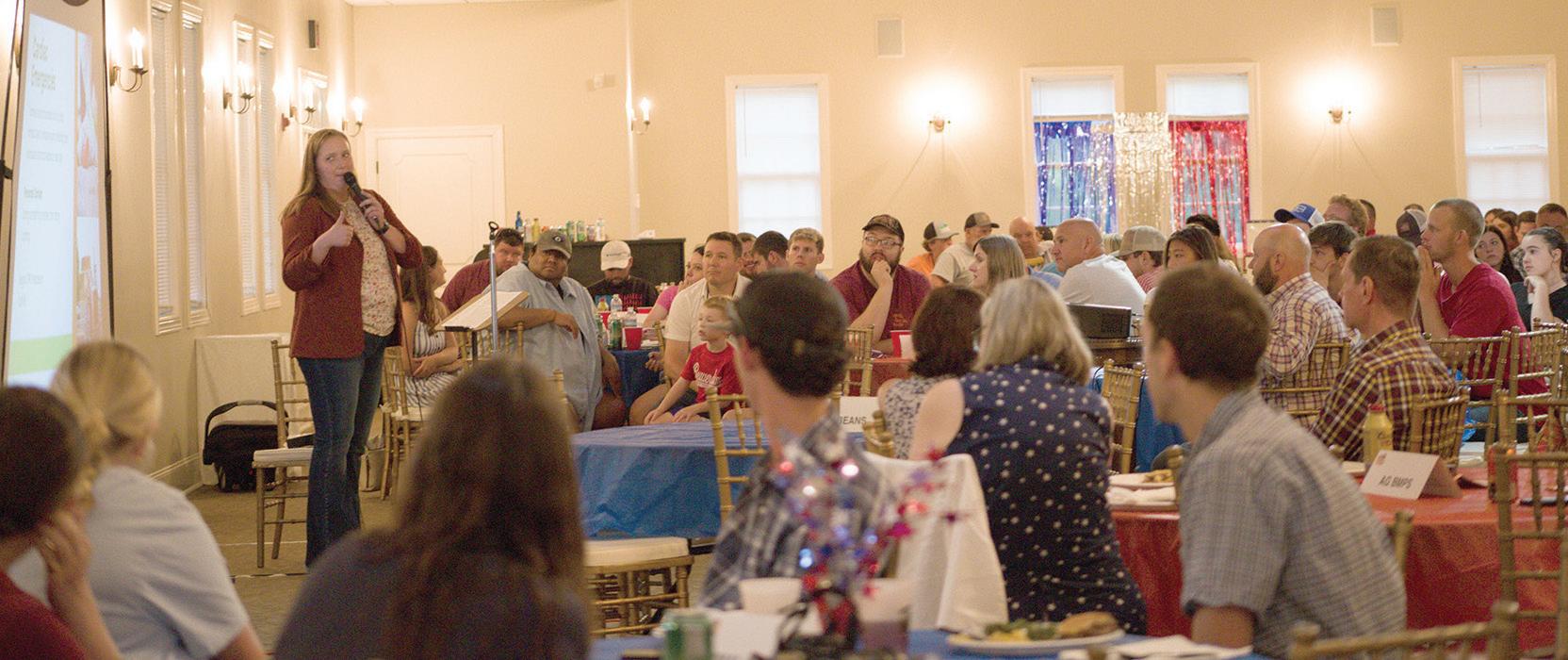
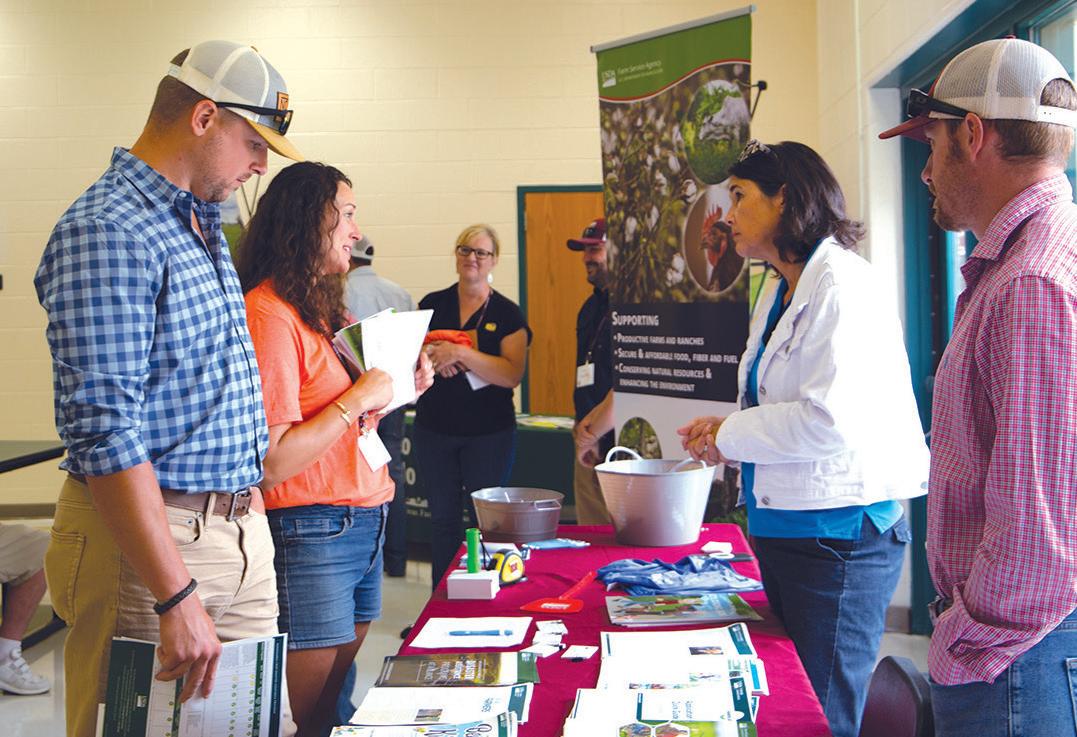

became sole owner and operator of her farm in 2022 and currently manages a commercial hair sheep flock..
She will receive a Kubota utility vehicle, a cash prize and a travel package to the 2025 American Farm Bureau Federation Annual Convention in San Antonio in January.
Runner-up Dustin Francis of Halifax County also will receive a travel package to the AFBF convention.
Bradley Ragsdale of Pittsylvania County was named winner of the 2024 VFBF Achievement Award, which recognizes young Farm Bureau
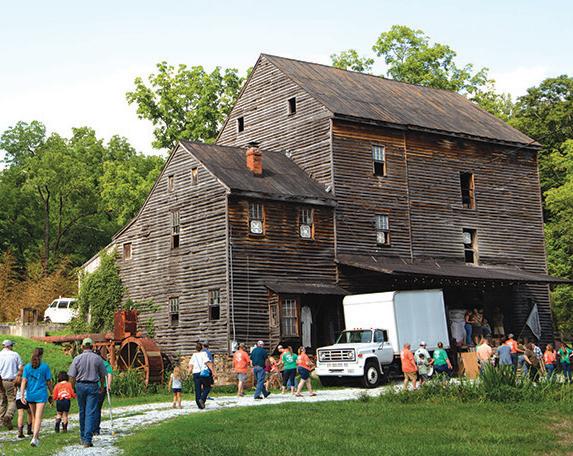
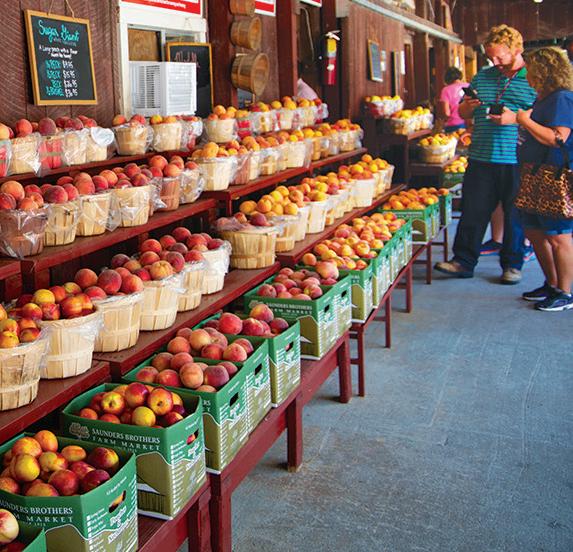
Young Farmers listened to speakers, toured local farms like Saunders Brothers and participated in educational workshops.
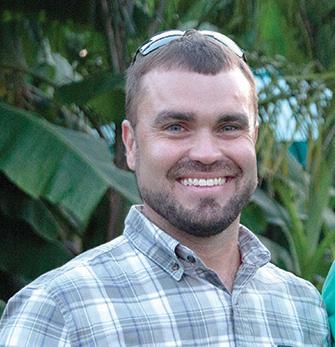
members for their efforts and leadership in production agriculture. Ragsdale is a fourth-generation tobacco, grain and beef cattle farmer who has helped manage, innovate and expand his family’s 1,000acre operation since 2009, including acquiring an additional 90 acres of cropland in 2015.
He will receive a 250-hour lease on a piece of Kubota equipment, a utility vehicle, a cash prize and a travel package to the 2025 AFBF convention.
Runner-up Pam Jones of Loudoun County will receive $500 and a travel package to the AFBF convention.
Rockingham County student named Outstanding Young Agriculturalist
Grayson Long of Rockingham County was named the 2024 VFBF Outstanding Young Agriculturalist.
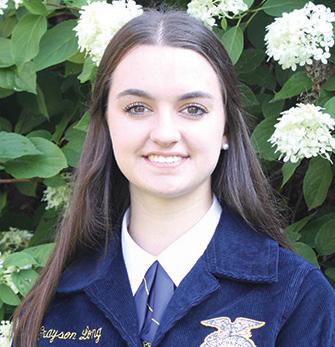
The recognition program is organized by the VFBF Young Farmers Committee and honors high school juniors and seniors for academic, community and agribusiness achievements.
Long has held various leadership positions in 4-H and FFA, including serving as federation reporter and vice president for Rockingham Federation FFA. She also helps present her family’s agriculture education program at local schools, businesses and events throughout the year.
She will receive a $1,500 scholarship and a travel package to the VFBF Annual Convention in Hot Springs Dec. 2-5. Runner-up Franco Abud of Spotsylvania County will receive $500.
Young Farmers also participated in the annual Discussion Meet, which is a simulated committee meeting. Participants are judged on their active participation, understanding of agriculture issues and ability to build consensus on predetermined topics.
This year’s finalists are Thomas French and Ashley Kuhler, both of Shenandoah County; Marshall Slaven of Augusta County; and Adam Davis of Halifax County. They will compete at the VFBF Annual Convention in Hot Springs on Dec. 3.
The 2025 VFBF Young Farmers Winter Expo will be held Feb. 21-23 in Franklin County.
BY NICOLE ZEMA
Former Sen. Frank M. Ruff Jr. was honored with the Distinguished Service to Agriculture Award by Virginia Farm Bureau Federation. The award was presented to Ruff during a private event with his family on March 26.
Ruff has a long track record of supporting the state’s No. 1 industry and historically has sought to understand the unique needs of the farming population.
He served in the Virginia House of Delegates from 1994 until 2000, when he was elected to the Virginia Senate. He retired from the Senate in December 2023. Ruff held seats on key committees in the Virginia General Assembly that influenced policy impacting farmers, including the Agriculture, Appropriations, and General Laws & Technology committees. He also chaired the Virginia Tobacco Region and Revitalization Commission and the Center for Rural Virginia board of trustees.
“You were there to support tobacco
Justin Coleman has been hired as a field services director for District 4, which is represented on the Virginia Farm Bureau board of directors by Jeannie Dudding and serves members in Alleghany, Bedford, Botetourt, Craig, Franklin, Henry, Patrick and Roanoke counties.
Coleman lives in Floyd County and is transferring to the Membership & Field Services Department from the Virginia Farm Bureau Mutual Insurance Co., for which he was a Farm Bureau insurance agent in Pulaski County.
farmers during one of the most challenging times, when the Master Settlement Agreement was signed, leaving tobacco farmers without a seat at the table,” VFBF board member

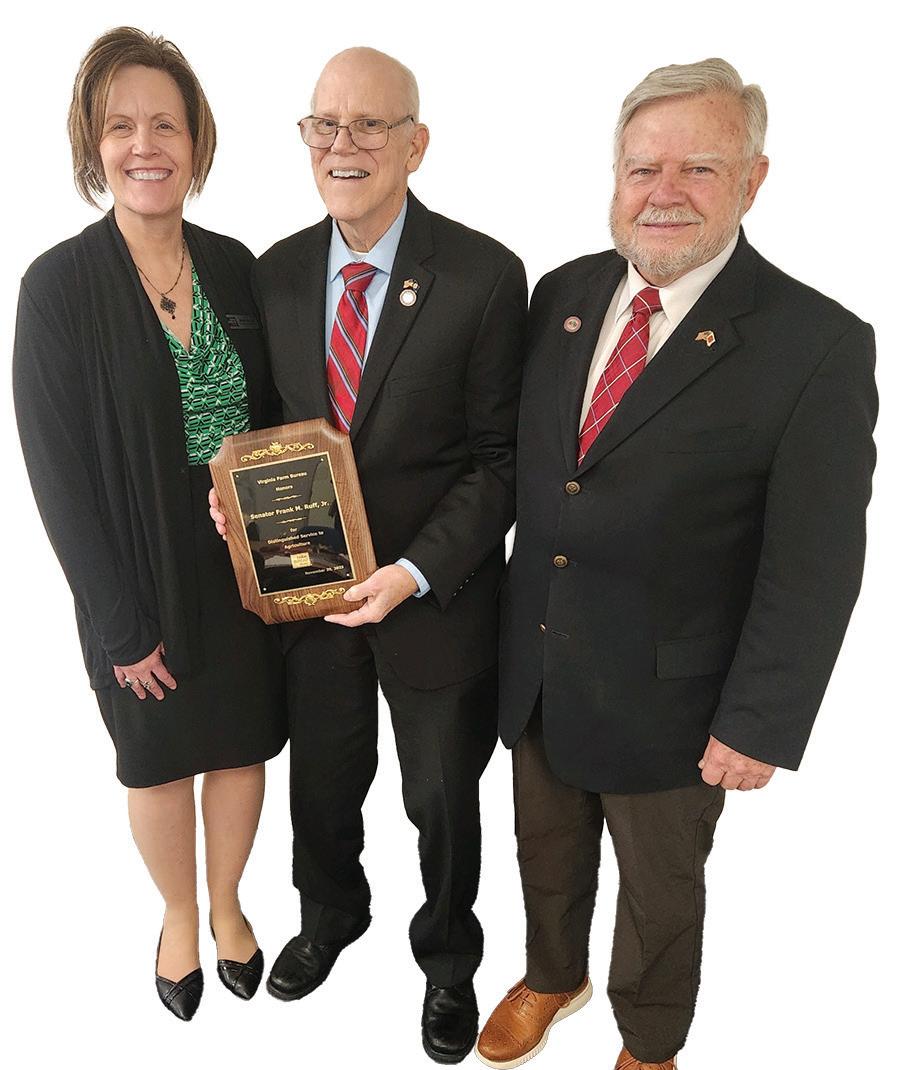


William F. Osl noted as he presented the award to Ruff. “You were part of the group of legislators who stood by them by including indemnification payments to compensate farmers and quota holders for the loss of tobacco quota, and ensuring monies were there to help revitalize the economies in those impacted rural communities.”

Martha Moore, VFBF senior vice president of governmental relations, added that Farm Bureau is grateful for Ruff’s 100% voting record with Virginia Farm Bureau Federation AgPAC for the last decade, “and we are pleased that he continues to be a true advocate for farmers. Without his leadership and seniority, Virginia Farm Bureau would not have been as successful on numerous critical issues.”
In the last few years, Ruff introduced budget amendments to provide funding
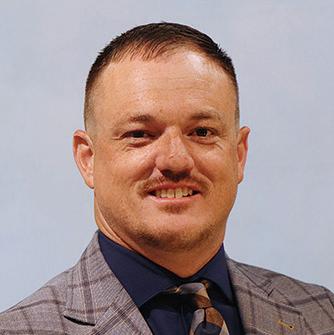
He also has a small cattle operation in Floyd’s Indian Valley District, so his experience encompasses all that Virginia Farm Bureau represents.
He and his wife, Sara, and four boys are active at Fairlawn Church of God and in the community.
“With Justin’s leadership and new, innovative ideas, District 4 will continue to be an active, vital grassroots force advocating for our members,” said Clay Francis, senior vice president of members and field services.
for FFA, the Center for Rural Virginia, the Wildlife Damage Cooperative Fund, the Forest Sustainability Fund, soil and water conservation districts, Virginia Cooperative Extension and the state’s agricultural best management practices cost-share program.
He carried legislation on industrial hemp and patroned a bill that increased state matching funds for the Reforestation of Timberlands Program. He also co-patroned legislation that amended Virginia’s Right to Farm Act. Additionally, he previously sponsored legislation to create Virginia’s Century Forest Program.
Applications for the Virginia Farm Bureau Federation Ambassador program are now beings accepted. The entry deadline is Dec. 31.
Applicants don’t have to be Farm Bureau members, but they must be between 18 and 23 years old by Dec. 31.
Participants are required to complete an application and take part in an interview by a panel of judges.
Finalists will present their platforms at the VFBF Women’s Leadership Conference April 3-6 in Richmond. The winner will receive $2,000 and first runner-up will receive $500. To apply, go to bit.ly/4dtp1xd
Since 1965, Virginia Farm Bureau’s Products Division has been providing members with quality farm products at competitive prices, and now members can order everything from tractor tires to baler twine online.
Products.vafb.com now offers online sales for customers who prefer to order directly from the website without calling to arrange payment. And a new distribution center located in Franklin County makes products more readily accessible to western and southwestern members.
The VFB Products Division warehouse in Henrico County will welcome visitors to its biannual open house, where members can enjoy discounts on select items Sept. 23-27.
As an expression of appreciation, members will receive a 10% discount on all items except crop packaging products.

Previously, online transactions were limited to dealers only, said Daryl Butler, director of product services and market development. Members are now welcome to shop and complete transactions online. They also can build a “wish list” saved to their profile at products.vafb.com
“Processing all-online orders is not only more efficient, but user friendly and accessible,” he said. “Whether you’re in Virginia, Texas or California, the website will calculate the taxes based on your locality, with multiple options for carriers.”
Plus, farmers don’t work a typical 9-to-5, Butler added.
“They may be coming in at 11 p.m. after their equipment broke down,” he said. “They can look at the website right then and see if there’s a product to get them up and running. They can make a purchase, we process the order, and get it delivered quickly.”








BY NICOLE ZEMA
The summer growing season was hot and dry, with moderate drought conditions persisting statewide, roasting crops and cutting into hay supplies.




Contending with the financial fallout of these challenges can negatively impact farmers’ mental health, said corn and soybean grower Lynwood Broaddus of Caroline County, who serves on the Virginia Farm Bureau Soybeans & Feed Grains Advisory Committee.
“You may have invested at least $700 an acre into your corn crop, not to mention your time and sweat,” he lamented. “Then every day you're watching it dry up and die, hoping you will make something, or






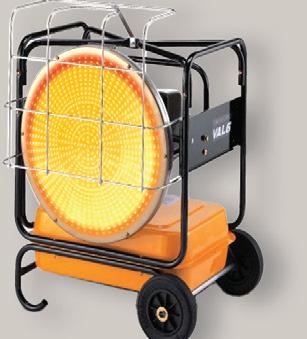


at least crop insurance covering enough to try again next year.”
And for some farmers, there might not be “a next year,” Broaddus continued. “This can be very stressful and, in many cases, lead to depression.”
When an excessive expense like weather-related crop loss drains cash from a farm or business, the quickest way to improve the financial situation and ease stress is to reduce expenses on the homefront, said Alex White, professor of farm and financial management at Virginia Tech.
“A family living budget helps you see where your money is going and how it is being used,” he said.
In partnership with Farm Credit University, White collaborated on the creation of a Monthly Family Living Budget worksheet that helps estimate current family living expenses.
The budget worksheet accounts for gross income, taxes, savings and investments, plus personal and unplanned expenses.






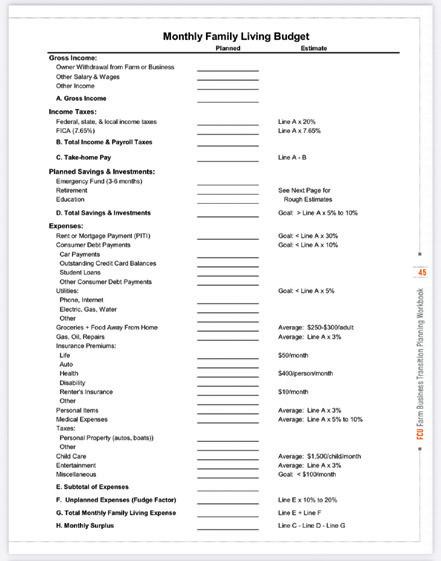
• Gather information from household records, like the checkbook register or credit card statements. Enter your best guess for each if records aren’t available.
• Do not include any business expenses in this budget. If you are unsure of what value to enter, use the “estimate” tips that are listed on the right side of the budget.
• Items requiring estimation indicate areas of your household recordkeeping system that need improvement.
• See the full Farm Credit University Farm Business Transition workbook at bit.ly/3y1kzWX for other planning, saving and transition resources.
ARTICLE AND PHOTOS BY NICOLE ZEMA
It takes more than a passion for agriculture and willingness to farm for newcomers hoping to access the industry. The ever-increasing price of land and livestock; lack of credit for financing; high interest rates; prohibitive equipment and infrastructure costs; plus development pressure encroaching on available lands are major barriers to the dream. But some new farmers have seized their destiny by forming relationships and building sweat equity and the trust of retiring farmers willing to give them a chance.
Virginia Farm Bureau Federation conducted a “Next Generation Farmer” survey asking young farmers to rank challenges facing new farmers. Thirtyeight percent indicated that land access was the top roadblock, closely followed by access to capital and financial investment.
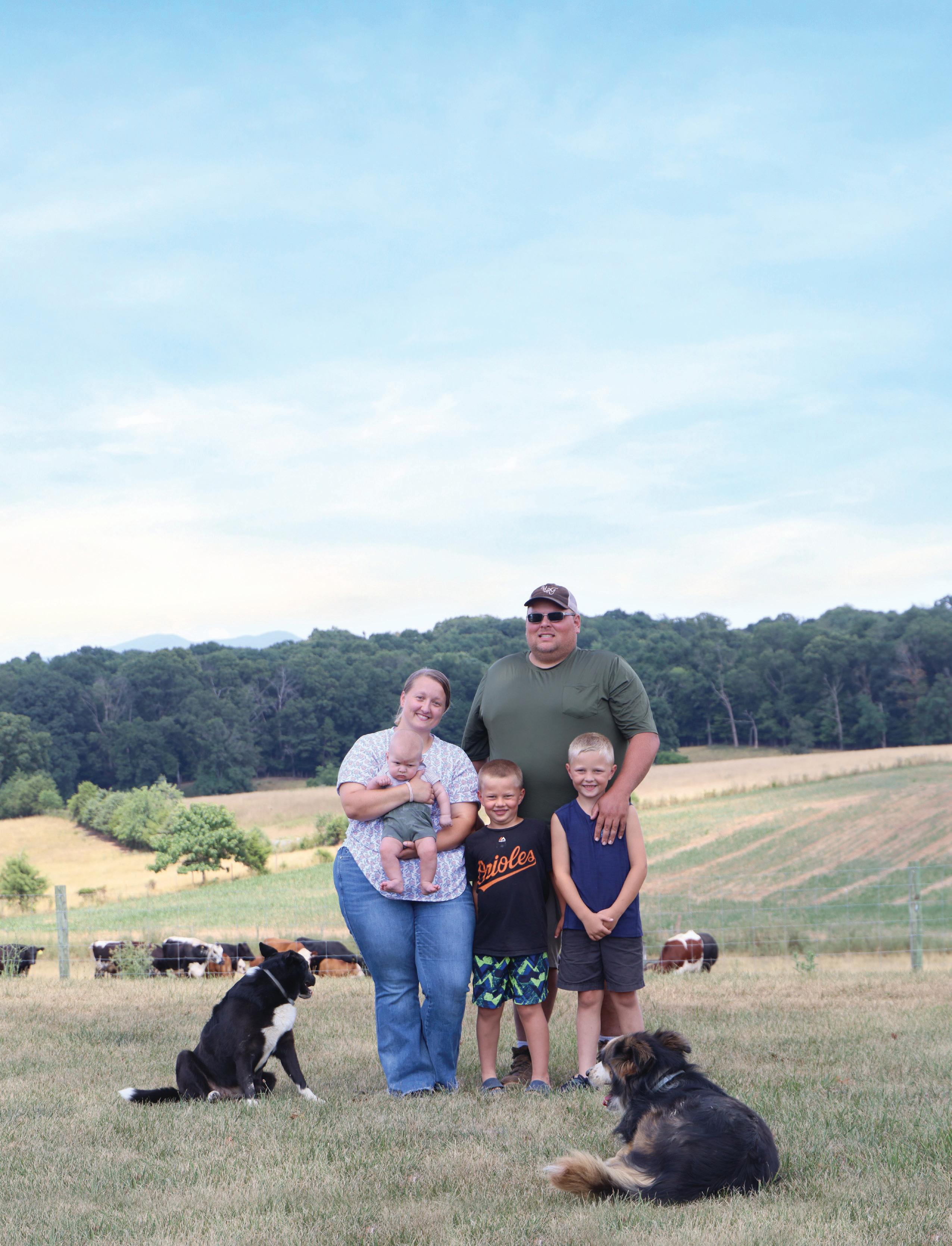
“My whole life I was told I wouldn’t ever be a farmer,” said Augusta County producer Austin McNett. “But it’s all I’ve ever wanted to do.”
Austin and wife, Nikita, both had grandparents farming in Rockingham County where they met.
“My grandfather pushed his kids not to farm, and my father had no interest,” Austin said.
His grandfather sold out when Austin was just 4 years old, and Nikita’s grandparents’ farm downsized. Options for family farm succession evaporated. And accessing farmland to start their own enterprise in Rockingham was too competitive.
“We knew we couldn’t farm there,” Austin recalled. “The price per acre
was so high. And we don’t have that war chest of generational farming or mentoring.”
Despite discouragement to pursue farming, Austin has worked agriculture jobs since his early teens. He began managing turkey houses, slowly increasing profitability for the operation. Eventually, that farmowner began to rent the McNetts pasture and cropland.
“We were really sharecroppers in the beginning,” Austin said. “A landowner is more likely to work with you if they get a percentage of the sales, instead of renting per acre. But all the responsibility and hustle was on us, the sharecroppers.”
Nikita said without significant assets for collateral, banks repeatedly turned them away.
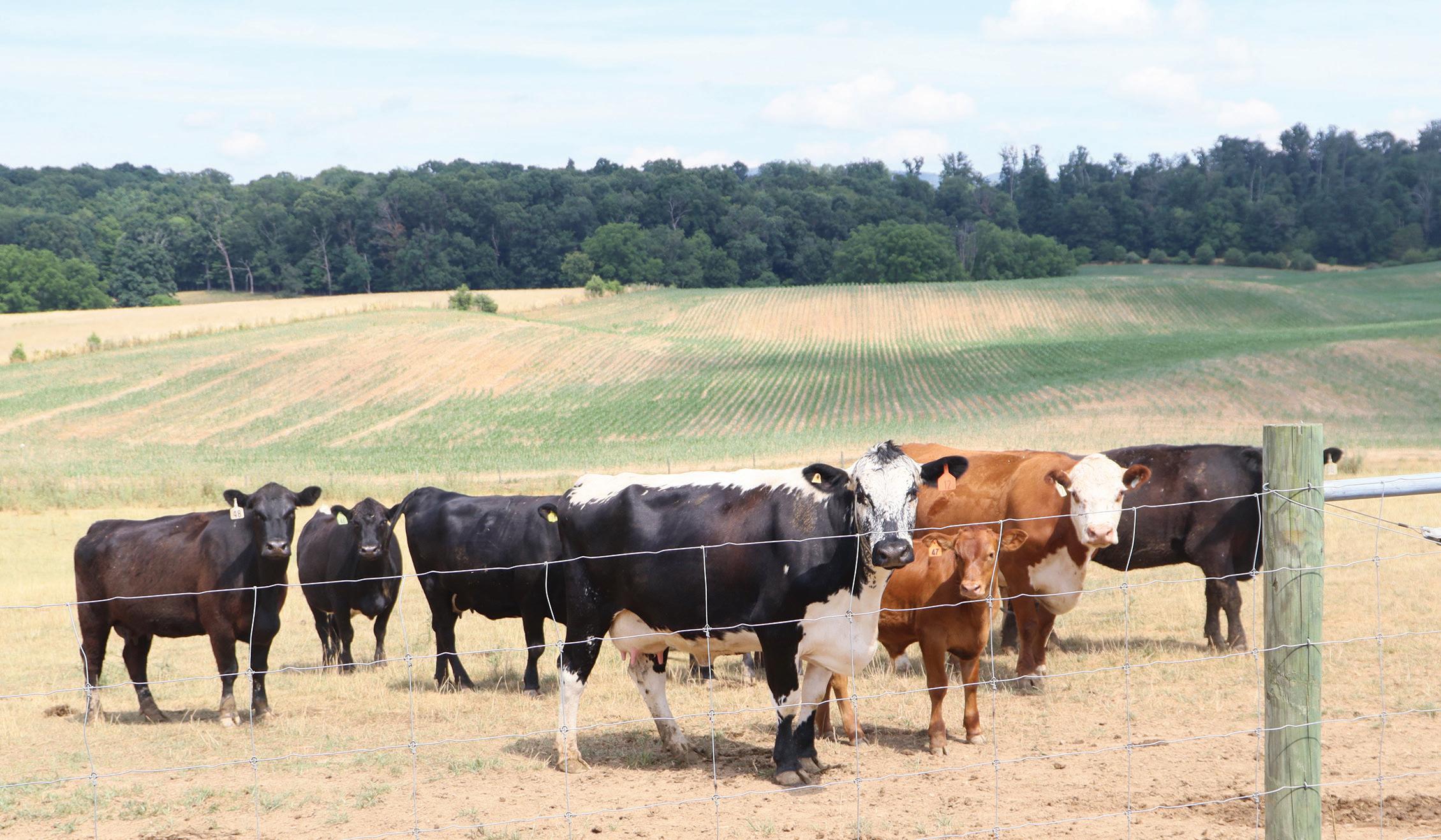
In 2019, Austin met Augusta County farmer Carl Caricofe, who was quietly trying to sell a farm without a real estate agent.
“Carl asked me, ‘Are you ready to buy a farm today?’ ” Austin recalled. “But I didn’t think the banks would give us a loan.”
Nikita said it was important to Caricofe that his land stay in farming.
“He could have subdivided it,” she said. “But he did want his set price. The cost of entry, like buying real estate, is astronomical.”
They found a farmhouse on 113 acres in New Hope.
“We didn’t have any money; we needed a whole bunch,” Austin recounted.
Caricofe and wife Polly ownerfinanced half the land, and the Farm Service Agency financed the other half.
“Nobody co-signed a loan for us,” Austin said. “We robbed Peter to pay Paul, poured blood, sweat and tears to get where we are today. People say it’s a miracle, but it was actually hell to live through!”
They were able to launch their retail meat business, McNett’s Angus Beef, plus raise feeder cattle, goats and a calf-cow operation, and grow crops. They procured another 52 acres on a second farm.
When Caricofe unexpectedly died in January, the McNetts visited Polly and expressed gratitude for the opportunities they provided.
Polly told them, “Carl saw something in you that you don’t see in yourself.”
‘I knocked on his door’ Federal and state governments have created a variety of financial incentive programs for landowners. At the state level, tax credits and easement incentives can help with land access and transition to non-family.
Landlords appreciate the land-use tax break for keeping acreage in agricultural production, said Roger Scott of Madison County, who farms cattle and poultry with his wife, veterinarian Dr. Amanda Weakley-Scott.
They rented an underutilized 350acre Orange County farm in 2013.
“I went and knocked on his door,” Scott said. “I told him we’ll bushhog it twice a year and take care of the fertilization. He was happy to do it!”
Unable to afford the livestock, the Scotts struck a custom-grazing deal with 75 cows from another farmer.
“We got 70%, and they got 30% of sales,” Scott said. “As beginning and young farmers, we couldn’t get the loan for the cows, so we built up some equity, and sweat equity, and then we were able to transition to buying the cows. It was a perfect way for a retiring farmer to help out a younger farmer, so they don’t have to borrow a lot of capital.”
It takes time to build trust with longestablished farmers, said Rachel Henley, VFBF working lands and state advocacy specialist.
“You’re not just going to buy land and then start learning,” she said. “Shortterm contracts are a smart way to build a herd, farm experience and equity.”
Although there are federal and state financial incentive programs for new farmers to buy farmland, Virginia has no official land access incentive program, Henley noted.
‘You’re going to earn it tenfold’
Of the tools needed for land access, work ethic is No. 1, Austin said.
“If you’re not willing to give every ounce of your money, time and brain cells, you’re not going to make it,” he said. “Don’t expect to walk into a turnkey, cookie-cutter farm. You’re going to earn it tenfold.”
Nikita now works full-time for the Farm Services Agency, which provides health insurance for the family. Starting a farm is about relationships and luck, she said.
“There’s no ground that’s not already spoken for around here,” she said. “But it changes hands because somebody knows somebody.”
The McNetts have three young sons to carry on the farming tradition.
“Our kids will have a base to start with, where we did not,” Nikita said. “And if they’re not interested in farming, we’d probably do for someone else what was done for us.”
American Farmland Trust Buy-Protect-Sell strategy: AFT will purchase a family farm, protect the farmland with an agricultural conservation easement, and then sell the farm to beginning farmers at a reduced price. The easement removes the development rights, limiting nonagricultural development and will reduce the overall price of the property, making the farm more affordable. Visit farmland.org/keeping-farmers-on-the-land to see details.
Certified Farm Succession Coordinators: The International Farm Transition Network trains professionals on issues frequently encountered by farm families, and many different tools and approaches to help navigate and plan for the ongoing process of transitioning your farm business to a successor either in or outside of the family. For a list of coordinators visit farmtransition. org/coordinators
Farm Agricultural Resources and Mediation of Virginia: FARMVA works to help settle disputes involving family farm transition in Virginia and North Carolina free because it is underwritten by a federal grant through USDA. For more information visit affiliate.wc.
Farm Credit of the Virginias: FarmLaunch is a start-up loan program to support young and beginning farmers and military veterans entering the industry with limited financial resources. FarmLaunch financing provides access to funds, educational resources and mentorship. Learn more at the Farm Credit Knowledge Center at farmcreditofvirginias.com/knowledge-center


Farm Service Agency: The U.S. Department of Agriculture’s FSA offers up to 100% loans capped at $600,000 to help farmers get the financing they need to start, expand or maintain a family farm. Visit lat.fpac.usda.gov for the loan assistance tool.
Virginia Farm Link: Farm Link is designed to help retiring landowners who want to see their land and businesses stay in production; beginning and expanding farmers in search of business arrangements through which they can acquire land, equipment and experience; and farmers who are in search of farm transition and succession planning resources. The program is part of the new Office of Working Lands under the Virginia Department of Forestry that can establish conservation easements. Match with farmland owners and seekers at virginiafarmlink.org.
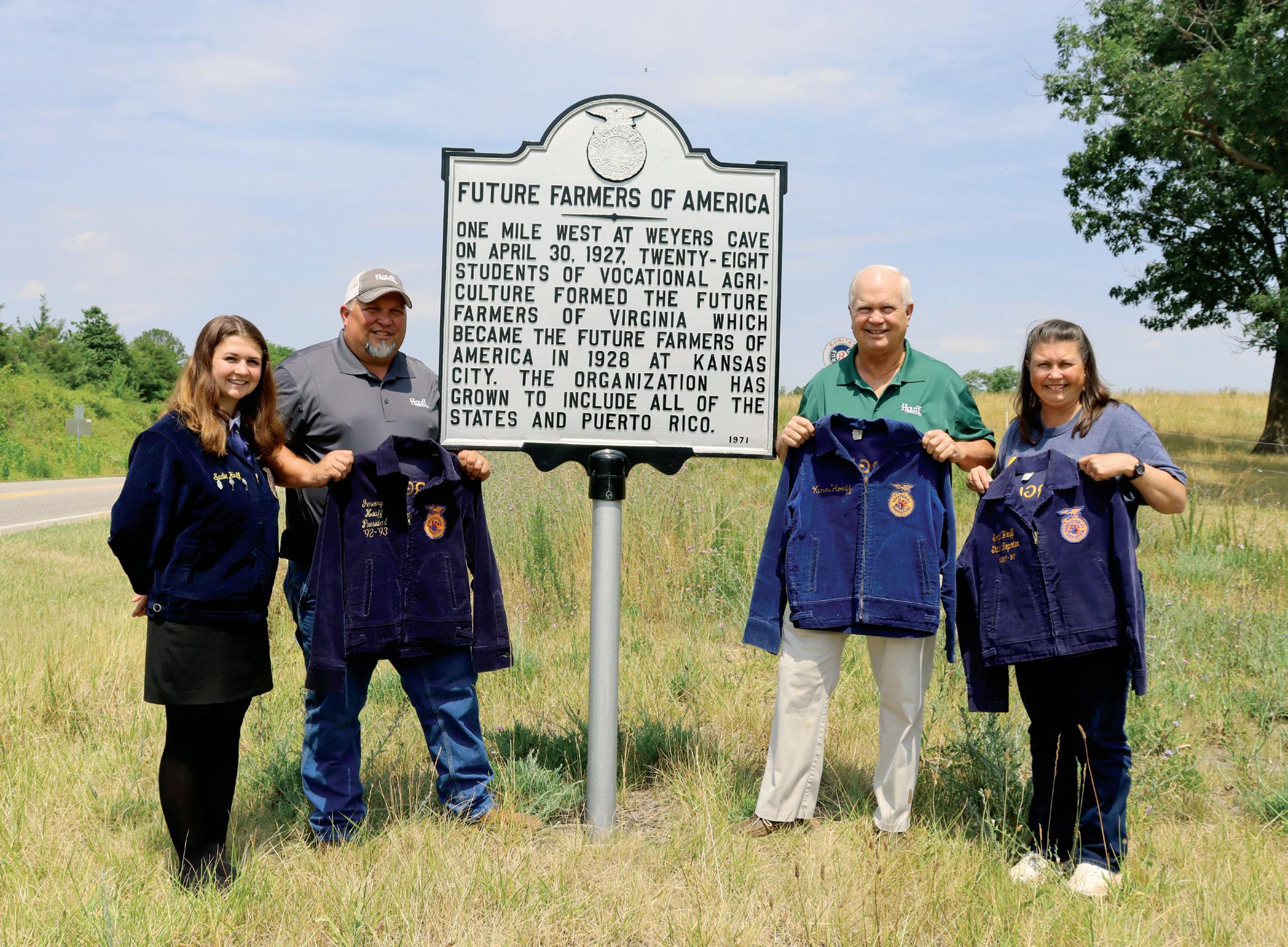
BY ALICE KEMP
For nearly a century, FFA has fostered youth development, evolving from rural communities to a nationally recognized standard in agricultural education that’s embedded in American culture.
It began in 1925 with the creation of Future Farmers of Virginia by four Virginia Tech agricultural educators— Edmund Magill, Henry Groseclose, Walter Newman and Harry Sanders.
“Farm boys didn’t have as much confidence in themselves as their city cousins did,” explained John Hillison, retired Virginia Tech agriculture
education professor and curator of the Agricultural, Leadership, and Community Education Department’s FFA Historical Room.
“So the founders said, ‘What if we had an organization where they learn leadership skills, win competitions and get awards for their work?’ That’s how it all got started.”
Soon, several states had their own organizations, and the national Future Farmers of America was founded in 1928. The national organization was modeled after FFV and became a renowned intracurricular student organization.
But while FFA emphasized leadership among rural youth, during segregation in the American South, the organization was open primarily to white, male students.
Recognizing this, H.O. Sargent, an agent of the Federal Board of Vocational Education, proposed a new program.
“He said there needed to be something for Black and minority students like they were doing for white students,” Hillison explained.
Spearheaded by agricultural professors G.W. Owens and J.R. Thomas at Virginia State College—now
Virginia State University—the New Farmers of Virginia was established in 1927. The New Farmers of America followed in 1935 and was modeled after NFV.
Eighteen states, mostly in the South, had NFA charters representing over 1,000 chapters and 58,000 Black and minority members. Following the Civil Rights Act of 1964, a federal decree urged the two organizations to consolidate, and NFA merged with FFA.
“NFA taught (students) to look where you are, look where you are going and what you can become,” said Oliver Bennett, an agriculture teacher in Northampton County. Bennett joined FFA in high school shortly after the merger and had agriculture teachers who also were NFA advisors. Similar to FFA, the NFA had various animal and crop competitions and highlighted career skills like public speaking. Through its vocational training and professional development opportunities, Bennett said, the organization was dedicated to cultivating leadership and “encouraged hard work and emphasized family.”
NFA “let you know how to prepare yourself, how to accomplish things and get ahead in life,” Bennett said.
Families often pass traditions from generation to generation. For the Houff family, that tradition is FFA.
Growing up on a dairy farm in Rockingham County, Kern Houff served as chapter vice president of the Montevideo chapter, where he competed in parliamentary procedure and public speaking and in the show circuit.
“We showed dairy cattle back then,” Kern reminisced. “The grandkids are into goats, hogs, sheep and steers now.”
Whether showing and judging animals or placing in career development events, FFA has been a cornerstone of personal and professional growth in the family. “Other than my parents, my two
agriculture teachers probably had more to do with the successes I’ve had than any other individuals,” said Kern, who was chair of the Virginia FFA Foundation board for many years. “I had a lot of opportunities I might not have had otherwise.”
Recognizing the value of communication, leadership and vocational skills “you can’t learn in books,” Kern gave his children, Jeremy and Sonja, “a little nudge” to join.
“We got to travel, meet new people and learn life skills,” Jeremy recalled.
Like his father, Jeremy showed dairy cattle and focused on leadership development. He served as Spotswood High School chapter president in the ‘90s. Like many FFA alums, he credits the organization for fundamental skills applied even today as supervisor of the family’s agricultural and industrial services company.
“You understand the impact it has on your life,” said Sonja, a dairy inspector who also farms with her husband, Jay Yankey, in Prince William County. Like her brother, Sonja served as chapter president. She was elected state FFA reporter and took a year off from school to travel the state, working with different FFA chapters, the public and news media.
“It was a once-in-a-lifetime opportunity,” she reminisced. Sonja added that their children will join FFA once they reach high school.
Hailing from the Weyers Cave area, the Houff family is part of the area’s long FFA legacy. The Weyers Cave chapter is recognized as having the country’s first FFA chapter charter.
“Going to the national FFA convention to see 45,000 people there knowing it was formed in our hometown—that’s a neat thing,” Jeremy said.
While the Houff family demonstrates FFA’s generational influences, their experiences also offer a glimpse into the organization’s evolution.
“My chapter has a predominately girl officer team this year,” remarked Jeremy’s daughter, Sadie, who will be entering her sophomore year at Spotswood High as chapter vice president. “For the past three years, all of our state presidents have been girls.”
Prior to 1969, women weren’t granted FFA membership. Today, they make up 43% of all FFA members and hold 50% of state leadership positions.
And as the agricultural landscape changed, so did FFA and its members.
“It was mostly production agriculture back when I was involved,” Kern noted. In 1988, Future Farmers of America rebranded as the National FFA Organization to reflect diversity in agricultural interests and membership.
“I’ve noticed there are a lot more kids now who aren’t coming from a farming background,” Sadie noted. “They end up taking one of the agriculture classes and get involved in FFA.”
The children in the Houff family, like many other FFA members, also are involved in local 4-H clubs. Stay tuned for the next issue of Virginia Farm Bureau News, in which we will explore 4-H’s youth development program.







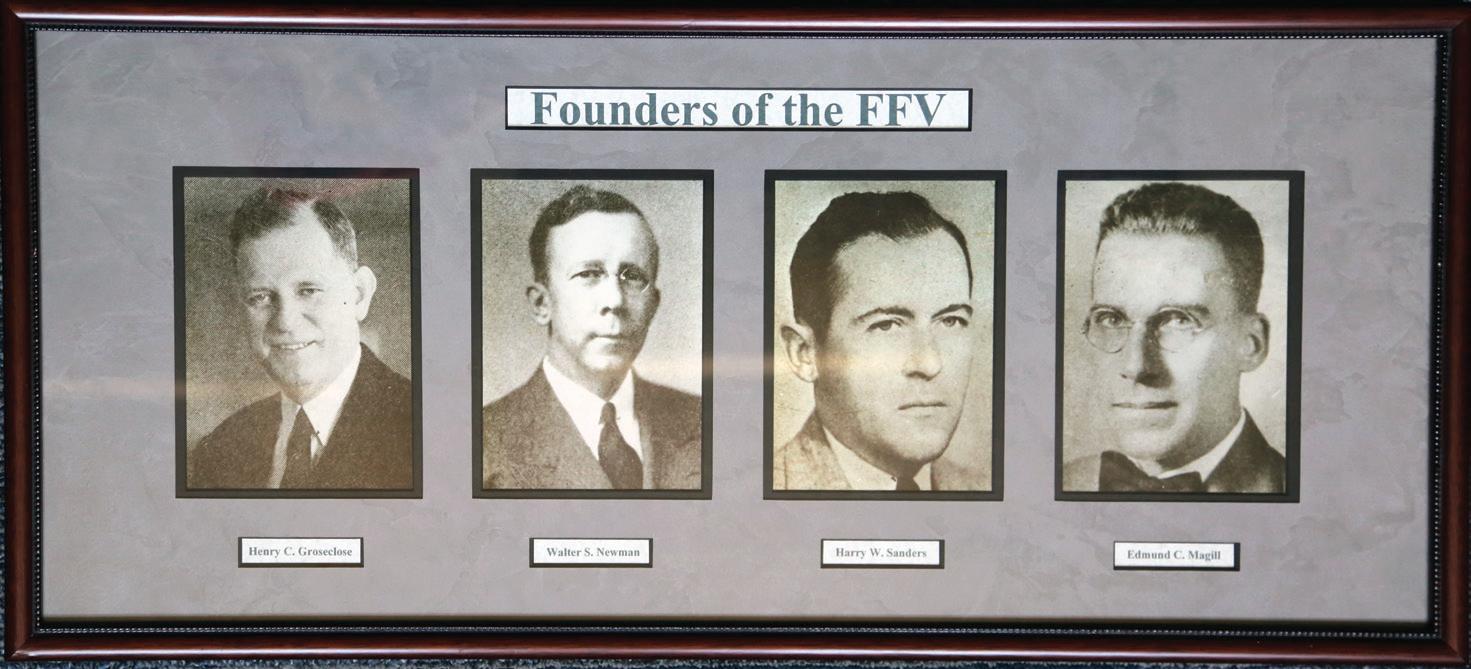
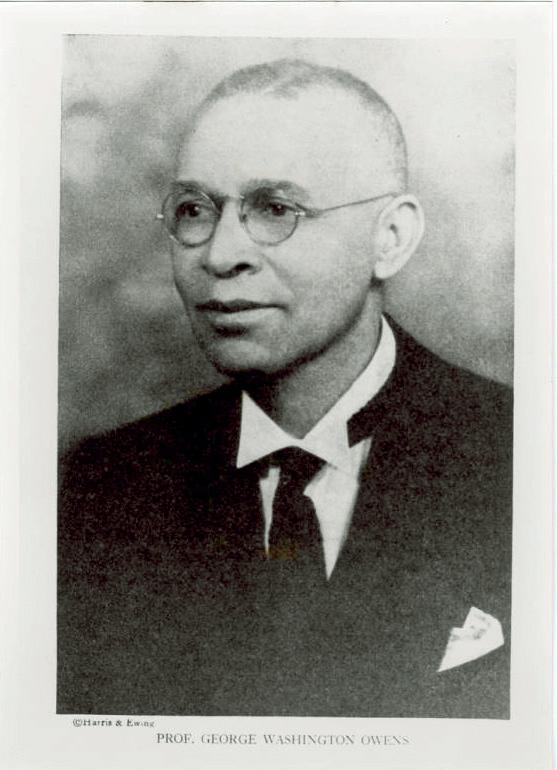
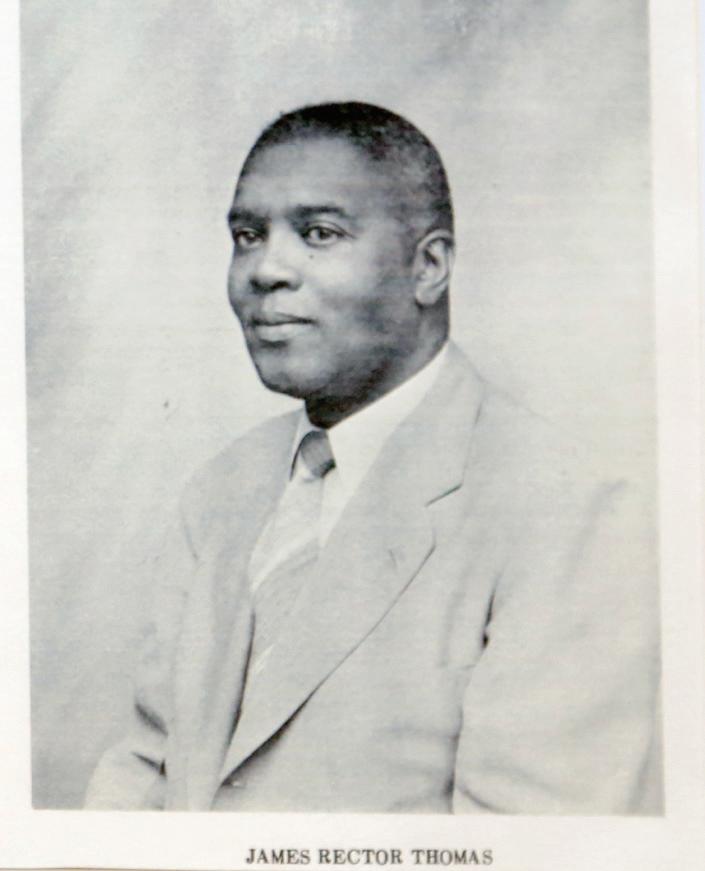
Virginia FFA has 14,110 members across 227 chapters.
There were 2,400 students at the 2024 Virginia FFA Convention.
The 2023 National FFA Convention attendance was 70,000.
Virginia FFA has the first state charter from the National FFA.
Virginia FFA has had 13 National FFA officers.
The 2022-2023 National FFA president was Andrew Seibel from Botetourt County, Virginia.
The Smithsonian National Museum of American History displays five FFA jackets; two from Virginia.

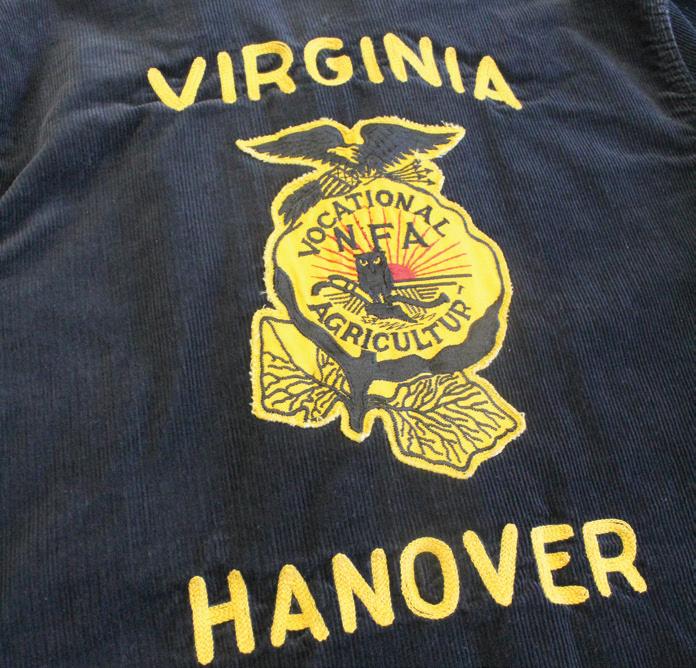
Carroll County Middle School’s FFA chapter was named the 2023 National Middle School Model of Excellence winner.
Virginia FFA will celebrate its centennial in 2026. National FFA will celebrate its centennial in 2028.
ARTICLE AND PHOTO BY KATHY DIXON
Like their Bermuda grass that grows back after it’s harvested, the Bass family regenerated their Campbell County farm.
When the tobacco buyout happened in 2005 and the market for their main crop dried up, Walter and Lou Ann Bass could have sold the thirdgeneration tobacco farm.
“Walter could have retired, and the boys could have found 9-5 jobs, but they are true farmers,” Lou Ann noted. “Their blood is made of dirt.”
And soil has provided a successful livelihood for the couple and their two sons, W.B. and Allen, who convinced their dad to start cultivating sod instead of tobacco.
That entrepreneurial spirit is one of the reasons Walter and Lou Ann recently were honored with the 2024 Sunbelt Ag Expo’s Virginia Farmer of the Year designation. It recognizes excellence in farming across the Southeast. One farmer from each of 10 participating states is selected, and the overall winner will be announced at the 2024 Sunbelt Ag Expo in October.
“They are a wonderful farm family who work hard together, with an entrepreneurial spirit that makes me smile,” shared Todd Scott, the Virginia Cooperative Extension agent in Campbell County who nominated the Basses for the award.
He added that they are respected in the community and utilize research data when making business decisions, which has served them well.


“After the tobacco buyout, they took a leap of faith and started the sod farm,” Scott explained. “We all know how new businesses can struggle and many don’t survive, but they came together as a family and have built an impressive farm business.”
On Aug. 13, the Basses celebrated 58 years of marriage. When Lou Ann met Walter, he was a teacher. “I married a teacher, not a farmer,” she recalled. But after only a year in education, Walter was drawn back to the farm, and Lou Ann became a farm wife.
She helped on the farm for a while, then focused on caring for the couple’s sons and their daughter, Leanne.
Walter’s grandfather started the farm in 1921, growing tobacco and raising beef cattle. Walter’s father continued farming it, and then Walter and his sons took over. After Allen studied agriculture at Virginia Tech, he came home with the idea of growing sod instead of tobacco on the registered Virginia Century Farm.
“It started as a part-time thing,” Allen said. “But then we just kept expanding.”
Walter said word got around “pretty quick,” and before they knew it, they needed more land. Now they lease 400 acres on a river bottom property that provides a good irrigation source for the Bermuda, fescue and zoysia grasses.
The sod is planted in the fall and harvested year-round to fill orders from landscaping companies,

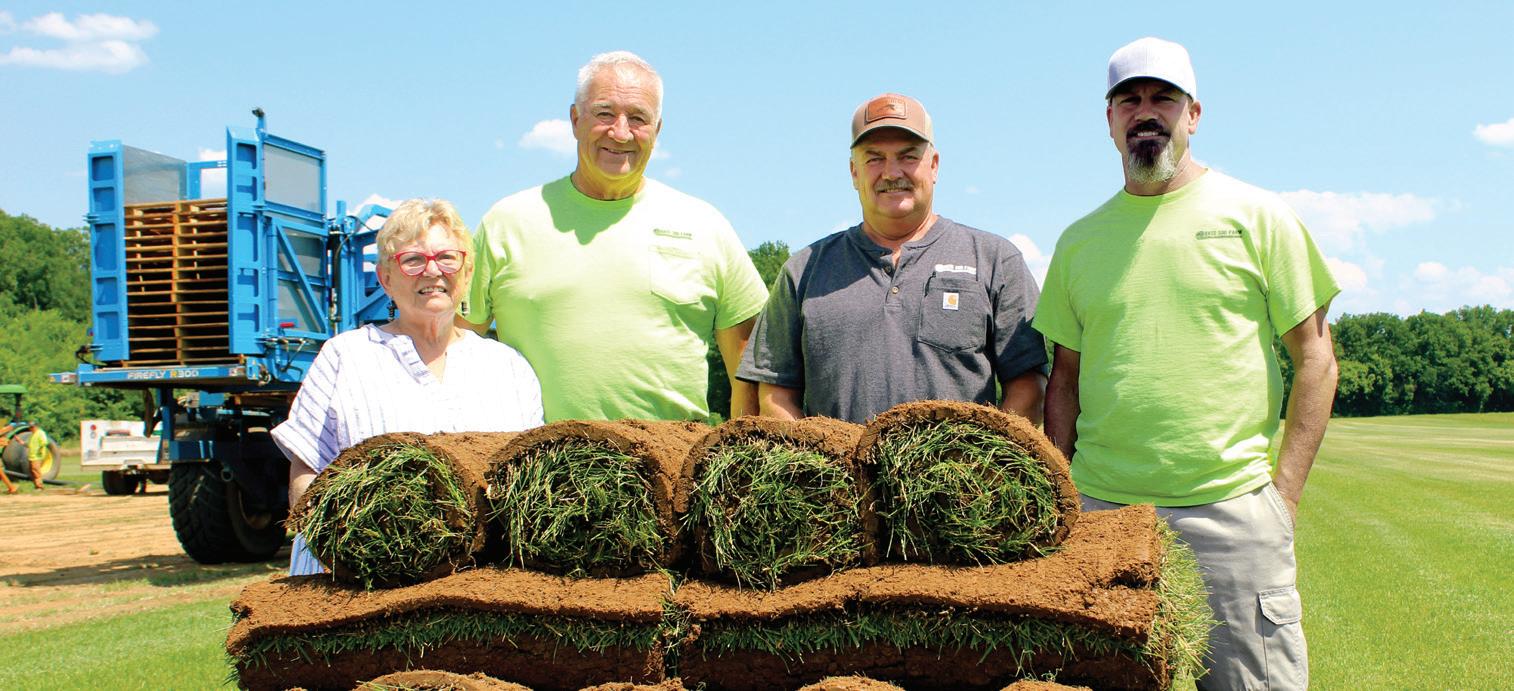
homeowners, contractors, golf courses, colleges and Lowe’s and Home Depot. It is harvested within 24 hours of delivery so that the roots can become established once installed.
Sod is conservation-friendly because it prevents erosion and holds sediments in the grass, preventing them from washing into waterways. And it greens up lawns quicker than grass seed covered with straw.
“Homeowners go to work, and their yard is dirt; but when they get home, it’s green because we installed sod,” Walter noted.
“It’s instant gratification,” W.B. joked.
In addition to the sod, the Bass family grows soybeans—950 acres of traditional soybeans and 40 acres of organic beans. The soybeans are sown using no-till planting, another conservation practice the Basses embrace. When the beans aren’t growing, cover crops are planted on the land to keep nutrients in the soil.
The Bass family also enjoys giving back to the community. They plant a sunflower field and invite friends and neighbors to dove hunt during the season.
Additionally, Lou Ann is a founding member of Rush Homes, which provides housing for people with disabilities. And Walter sponsors the Walter Bass High School Invitational Indoor Track Meet at Liberty University for about 2,000 high school athletes each year.
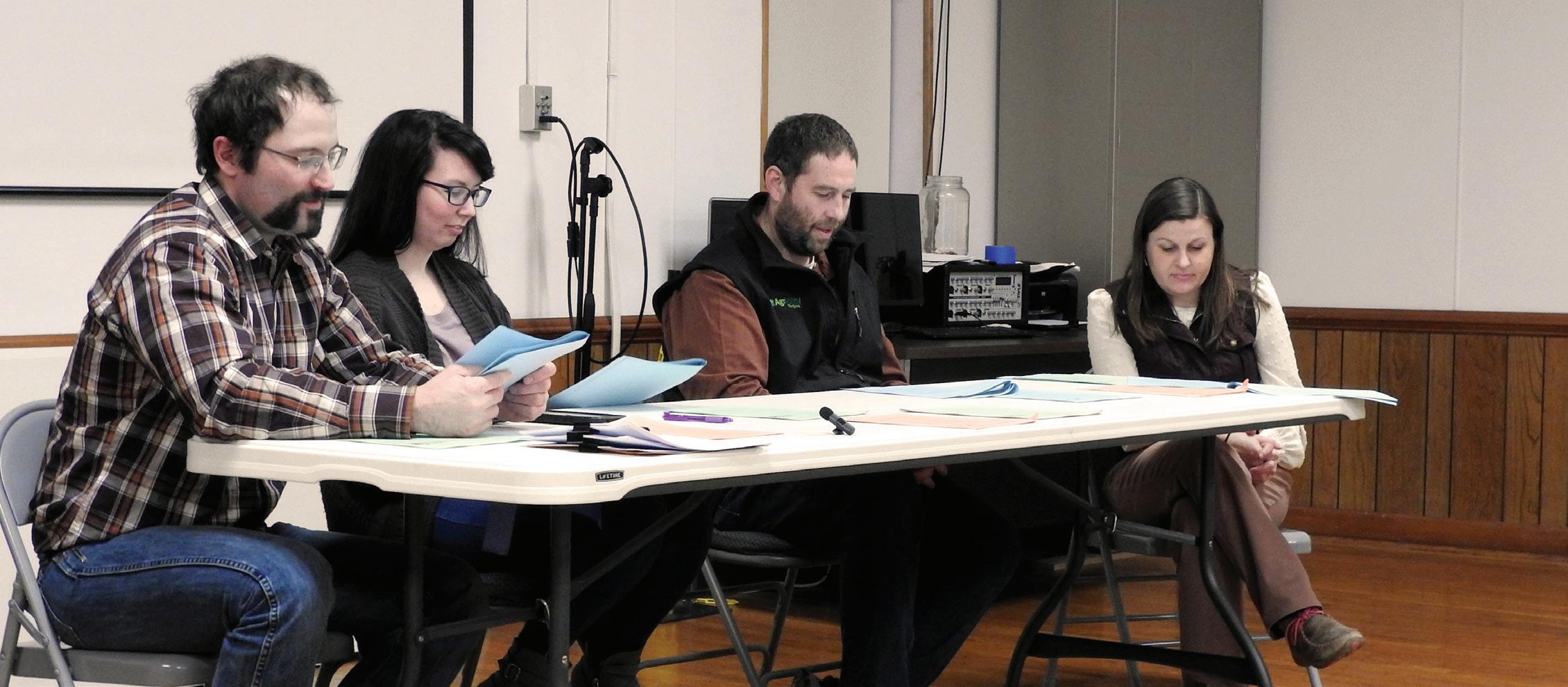
BY CHRISTINA AMANO DOLAN
The free meal gets people through the door, but the skits are what get them talking.
When attendees of Virginia’s Farm Dinner Theaters watch imaginary characters confront health and safety hazards on the farm, many come faceto-face with their own realities—and leave inspired to change them.
“It opens the door for difficult conversations,” said Kim Niewolny, program director for the Virginia Beginning Farmer and Rancher Coalition and AgrAbility Virginia.
It’s a novel approach to addressing widespread health and safety issues in the industry—offering farmers a fun, relaxed environment for processing sensitive topics and confiding in their peers.
“We’re not going to address all the issues in one night, but we can make some changes and perhaps even save some lives,” Niewolny remarked.
An instant success
Farm Dinner Theaters were created by Deborah Reed at the University of Kentucky.
The Virginia Beginning Farmer & Rancher Coalition and AgrAbility Virginia partnered with Reed to introduce the farm dinner theaters as part of the Virginia Cooperative Extension Farm Safety, Health and Wellness Initiative. The program provides webinars, publications and other educational resources on how to maintain a safe and healthy environment on the farm.
Virginia’s first two farm dinner theaters, held in Madison and Lee counties in 2020, were “huge successes,” Niewolny marveled.
AgrAbility Virginia hosted additional dinner theaters in Augusta, Franklin, Roanoke and Rockingham counties, thanks to funding from the Southern Region Farm and Ranch Stress Assistance Network, awarded by the Virginia Department of Agriculture and Consumer Services.
Led by AgrAbility Virginia team members, county Extension agents and local farmers, the theaters have drawn a wide range of participants, including FFA youth,
first responders, health care providers and non-farming residents.
“We welcome all to these sessions, and in fact that’s kind of the point,” Niewolny said. “It brings the community a little closer together based on these challenging topics.”
Each session features a free meal, three 10-minute scripted plays performed or read by local farmers and other community members, and a facilitated discussion.
Selected scripts are chosen from Reed’s FDT Toolkit and tailored to each community, exploring topics such as fall prevention, hearing conservation, tractor and road safety and farm stress.
“They’re performing a scenario that feels familiar,” Niewolny explained.
She’s seen youth discuss ways they see farm stress impacting their lives, like a family member getting on a tractor when “truly exhausted.”
Discussions always lead to “Me too’s” from the audience—from sharing personal stories of hiding the tractor
keys from a loved one to suffering from a preventable farm injury.
“Every conversation is different,” noted Jeremy Daubert, a Rockingham County Extension agent and FDT trainer. “It’s really unique to who’s there and what experiences they have.”
Daubert hosted three FDTs in the Shenandoah Valley in partnership with Valley Urgent Care and a local FFA chapter, later publishing an article on the successful programs. Drawing 90 attendees, the sessions explored aging out of farming, mental health, farming as a second career and farm family dynamics.
“In the farming community, a lot of people are going through the same type of stuff whether they realize it or not,” he added. “We’re helping people understand that they’re not alone.”
Many participants, walking away with farm safety resources and a network of support, offered heartfelt thanks to organizers.
“Our evaluations indicate that people definitely have significant changes in attitude and their ability to talk about these challenging issues in their communities and families,” Niewolny noted.
In the initial research study, Reed found that over 60% of FDT participants made significant changes to their farm safety practices within two weeks of the theater.
Those interested in hosting a FDT in their community contact Niewolny at niewolny@vt.edu or Daubert at jdaubert@vt.edu. They will provide training. To access the toolkit, evaluation materials and video, scan the QR code below.
For additional resources on farm safety, health and wellness, visit AgrAbility.alce.vt.edu

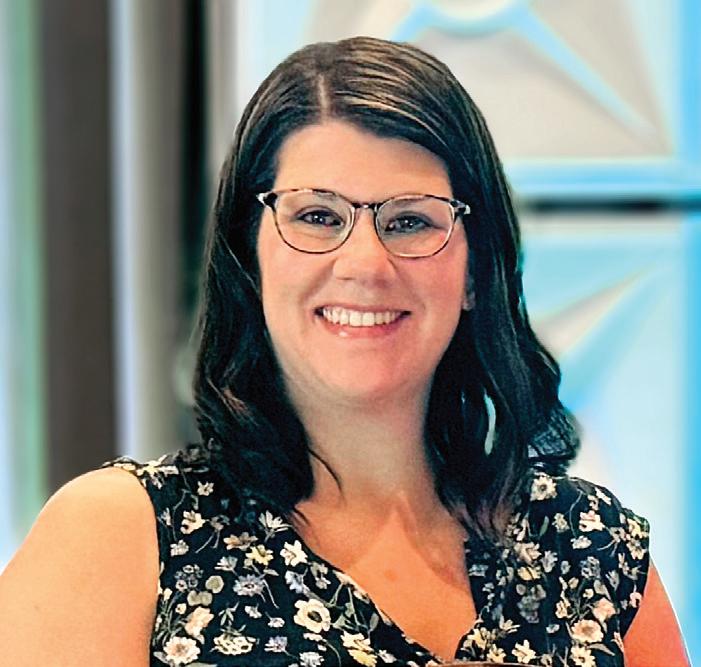
BY ALICE KEMP
Carter Humphries, a Virginia Cooperative Extension 4-H agent in Chesterfield County, has been awarded the 2024 Partnership in Agriculture Literacy Award by the National Agriculture in the Classroom Organization and National Grange.
The award recognizes Humphries’ partnership with Virginia AITC and her significant contributions to advancing agricultural literacy in her community. Through her AGventure Days program and other initiatives, Humphries has used her passion for education to share the importance of agriculture with over 25,000 students.
Humphries was presented with the PAL Award at the 2024 National Agriculture in the Classroom Conference in June in Salt Lake City.
“Carter is a stellar example of a successful partner with Virginia AITC,” said Tammy Maxey, Virginia Foundation for Agriculture in the Classroom executive director. “In her role with 4-H, she shares the goal of connecting children to agriculture and uses program resources to teach thousands of youth the value and need for plant and animal production.”
Humphries began AGventure Days in 2020. Through the program,
she collaborates with schools and teachers to create stimulating handson activities and lessons that engage students’ curiosity about agricultural concepts.
For students in suburban settings, the lessons are often their first experience in the world of agriculture.
“Many of these students don’t understand where their food comes from and don’t have a connection to agriculture,” Humphries said during a presentation to Virginia AITC’s board of directors. “So, I asked myself, ‘How can I bring that connection to them?’”
AGventure Days started with 1,800 students and 21 educators in six schools. By cultivating relationships with educators and organizations like VCE Master Gardeners, Humphries has grown the program to reach over 9,000 students and 148 educators serving 42 elementary schools.
Covering a variety of agricultural concepts like embryology, butterfly life cycles and classroom gardens, the program’s lessons are designed to benefit students across multiple subjects.
“Almost every educator has told me that because the program is not only in a specific classroom but at their school, the school attendance improved as a whole,” she said. “It’s great to hear how students are invested in the learning experience.”
The dedicated agriculture advocate also organized the Farm Graze event in Henrico County, where she previously served as a 4-H Extension agent before relocating to Chesterfield. Through partnerships with local organizations, the community event hosts interactive activities for children to learn about agriculture and its significance.
Humphries has received several grants from Virginia AITC for educational projects—increasing direct student impact. And each year, she participates in Agriculture Literacy Week, AITC’s volunteer reading event that provides a fun, interactive way to increase children’s knowledge of farming and food sources.
Similar to how local Crime Solvers programs work, Virginia Farm Bureau’s Reward Protection Service utilizes anonymous tips that lead police to solve arson, theft or vandalism that occur on Farm Bureau members’ property.
Through the program, members have access to free signs indicating their participation in the service. It offers a $2,500 reward for information that leads to the arrest and conviction of persons responsible for crimes on a member’s property.
“I love this reward program, but I don’t think our members utilize it enough,” said Carla Keesee, VFB investigations manager.
The program can be used by any Farm Bureau member, but it’s most often utilized by farmers and others who own rural property. That’s because those kinds of properties often are left unattended, making them prime targets for arsonists, thieves
and vandals.
“It’s a good program,” Keesee said. “I don’t think any other insurance companies have something like it.”
She emphasized that members can pick up signs at their local Farm Bureau office, and they need to be sure they post them where they are visible.
Under the program’s guidelines, rewards are available only when signs are posted in prominent locations on a member’s property at the time of loss. Members who own multiple properties must display signs at each location for those properties to be eligible.
If an act of arson, theft or vandalism occurs, an eyewitness can make a reward claim once the perpetrator has been arrested and convicted of a crime.
Once the claim has been submitted, Virginia Farm Bureau will assign the claim to its Special Investigations Unit for further review.
The SIU will verify with law enforcement that the claimant’s
information was key in securing a conviction. The $2,500 reward will be paid once the information is verified and if no other claimants come forward seeking the reward.
Should two persons file a reward claim, Virginia Farm Bureau will decide who receives the reward.
Claimants must provide an IRS Form W-9 with their claim, as the reward is considered taxable income.
Virginia Farm Bureau will issue an IRS Form 1099 alongside payment.
Virginia Farm Bureau employees, law enforcement and Farm Bureau members who suffered losses, as well as residents of those members’ households, are ineligible to claim rewards.
“The Reward Protection Service is another example of the value our members receive with their annual membership,” said Laurie Gannon, vice president of claims for Virginia Farm Bureau Mutual Insurance Co.

BY NICOLE ZEMA
Selfless humility. Fierce competitiveness. Unyielding tenacity.
Agency Manager Bart Mitchell has demonstrated these traits for 33 years, which led to him receiving Virginia Farm Bureau Mutual Insurance Co.’s highest honor—the 2023 Ralph Stokes Career Achievement Award.
Mitchell is based in Goochland and Henrico counties, also managing Farm Bureau offices in Chesterfield and Prince George counties.
The award was announced at the annual VFBMIC Sales Conference in Williamsburg. Mitchell accepted the award in honor of his dad, district sales manager Bert Mitchell, who retired from VFBMIC in 2002.
“He was known as a Southern gentleman, and that image has always stuck with me,” Mitchell said, accepting the award. “My dad taught me everything I know. I’m very honored to be a second-generation employee with Virginia Farm Bureau.”
Ray Leonard, VFBMIC vice president of sales, said he knew Mitchell’s father personally.
“And the apple doesn’t fall far from the tree.”
Last year’s Ralph Stokes honoree, agency manager Amanda Compton of Bedford County, presented the award. She said Mitchell’s positivity and lively spirit made an impression on her from the beginning.
“Our honoree is willing to help our organization and company grow and get better,” Compton said. “He is truly a global and strategic thinker and provides great insight and leadership to our company.”
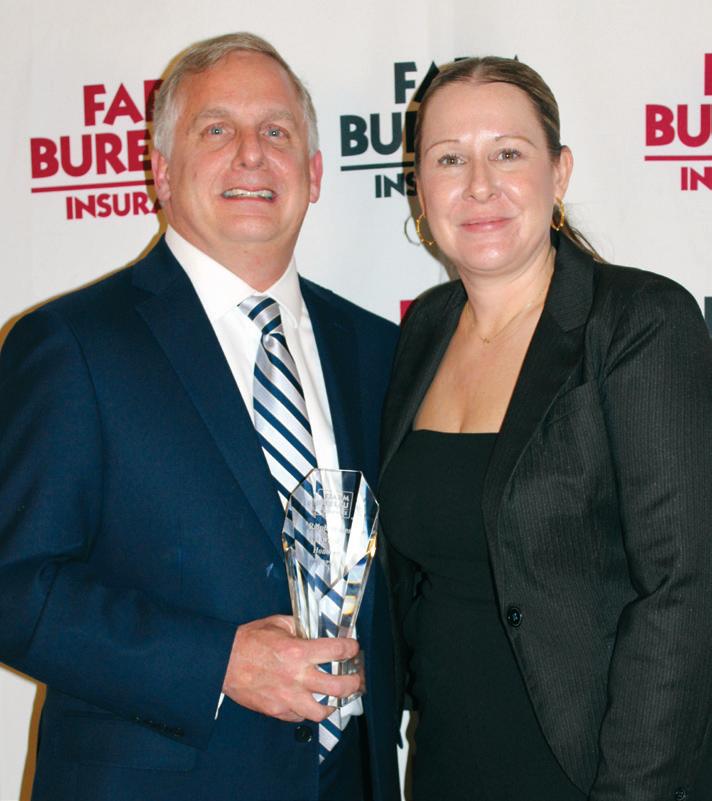
Mitchell has celebrated the professional and personal successes of colleagues and his insureds, she continued, while extending support during the challenging times in their lives.
“And more recently in the last few years, this support has been returned to him tenfold during times of his own personal loss—losing both his wife and an adult son in just a couple of years,” Compton noted.
Mitchell, flanked by his adult children James, Sydney and Mason, said the night was an emotional one.
“My family has been through a lot the last few years, and our faith has kept us grounded,” he said. “I’ve been very blessed by my clients, friends and family for the past 33 years of support. This award means so much to me.”
Nomination criteria include supporting the organization’s sales
and service objectives. Leonard said Mitchell has demonstrated this time and again by consistently qualifying for most bonuses, incentives and contests since joining the company. He’s also a top performer in the annual recognition program ranking, often achieving the Platinum designation level.
Mitchell joins Platinum Award winners and VFBMIC’s Most Valuable Agents on the 2023 Agent Advisory Council.
In his personal life, Mitchell has served on numerous committees and board seats to help ensure his church continues to thrive and remain a resource for the community. He also serves on an advisory board for a local business and is a member of the Longwood University Foundation Inc. board—his alma mater.
Compton said success in the insurance industry is dependent on fostering and establishing genuine relationships among insureds and potential customers.
“As has been the case with recent honorees, Bart makes an intentional effort to support fellow Farm Bureau employees,” she said. “He consistently reaches out to new agents throughout the company to introduce himself and offer support.”
Ralph Stokes Award Honorees since 2013
2022 Amanda Compton, Bedford County
2021 Jason Seward, Surry County
2020 Ed Terry, Floyd County
2019 Ed Sale, Amherst County
2018 Jim Jervey, Southampton County
2017 Chris Adams, Hanover County
2016 Mike Mullins, Washington County
2015 Debbie Murphy, Hanover County
2014 Jerry Funkhouser, Shenandoah County
2013 Robin Gloss, Campbell County
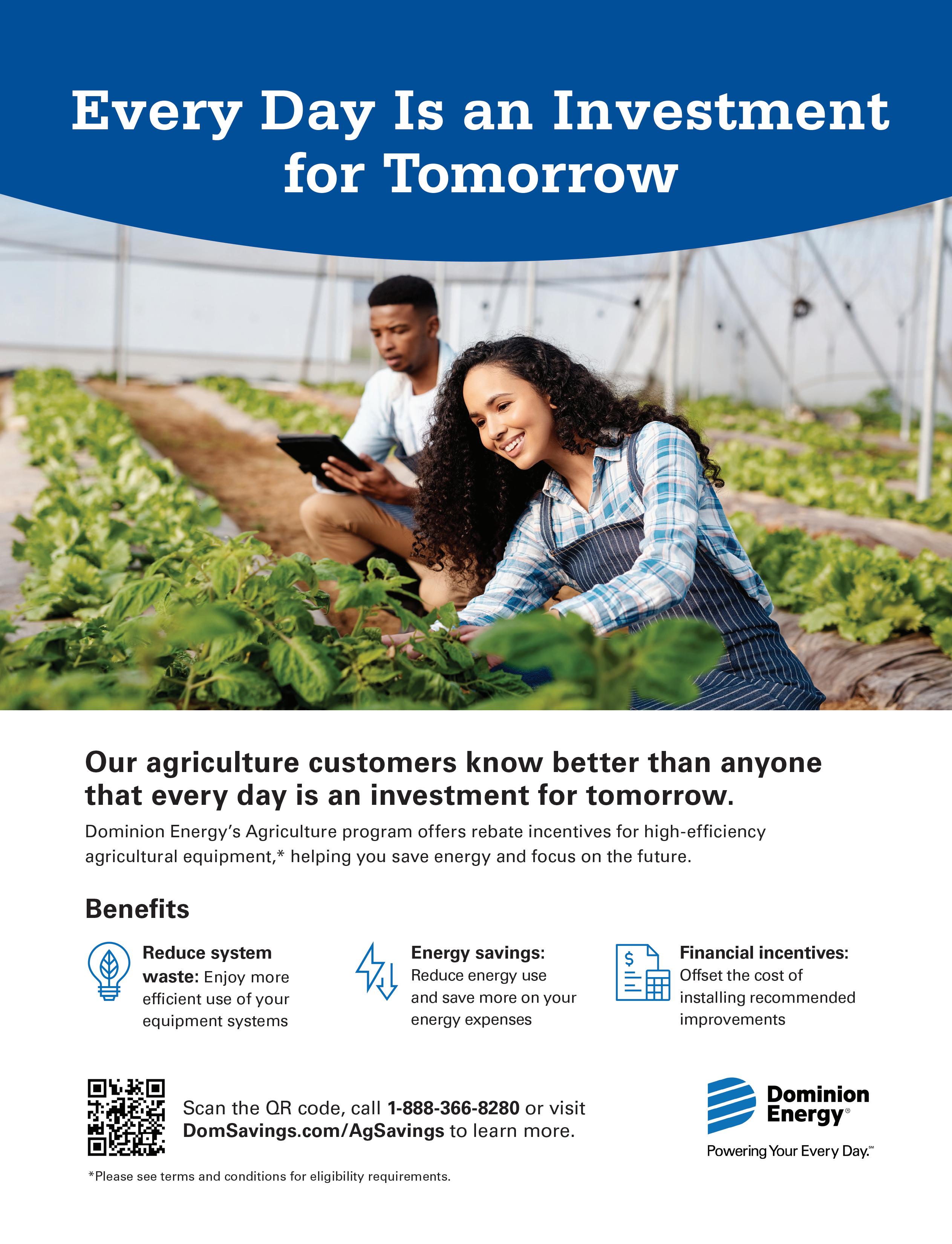
What did a tire shop and a small farm have in common?
They both faced the same problem—the owners wanted group health insurance for their employees. But traditional options were too expensive, putting employer-provided coverage beyond reach.
Until the WiseChoice Healthcare Alliance became available.
“When this new product came out, I thought, ‘Maybe this would be beneficial for them,’” reflected Meagan Vickery, VAFB Health Insurance Solutions senior account executive. “And the rates came back literally in half.”
That substantial savings allowed the businesses to purchase health coverage, providing additional employee benefits and peace of mind. It also allowed the farm owner’s wife, who carried the family insurance through a previous job, to start working on the farm full time.
An alternative to traditional group insurance, the WiseChoice Healthcare Alliance is a Multiple Employer Welfare Arrangement—a group of businesses that form an association to offer health benefits plans. Created by the Virginia Chamber of Commerce, the alliance partnered with Anthem to provide a portfolio of health coverage options.
The WiseChoice Healthcare Alliance offers small businesses with two to 50 employees opportunities to save by pooling their resources together as one larger self-funded group, ensuring protection and comprehensive benefits.
Businesses that join the group share overall claims risk with other small businesses and are backed by the financial protection of Anthem’s stop-loss coverage, as well as strict federal and state regulations. Plans are medically underwritten upon entry into the group plan, meaning participants with better-than-average health can enjoy lower, predictable costs.
Like traditional plans, WiseChoice plans cover preexisting conditions and preventive care. They have maximum out-ofpockets and copays, and offer Anthem’s broad network of doctors and health professionals.
To be eligible, businesses must be headquartered in Virginia and be a member of a participating chamber of commerce, Virginia Farm Bureau or another association affiliated with the WiseChoice Healthcare Alliance.
To learn more, visit vafb.com/health/insurance-forbusinesses, or call 800-229-7779.

Numerous businesses, individuals and organizations made contributions to the Virginia Foundation for Agriculture in the Classroom between July 1, 2023, and June 30, 2024.
Steward Level ($50,000+)
Virginia Farm Bureau Federation
Shepherd Level ($25,000-$49,999)
James River Equipment Co.
National Agriculture in the Classroom
Virginia Farm Bureau Mutual Insurance Co.
Harvester Level ($10,000-$24,999)
Finys
Southern Farm Bureau Life Insurance Co.
Virginia Corn Board
Virginia Farm Bureau Young Farmers Committee
Virginia Pork Council
Virginia Soybean Board
Grower Level ($5,000-$9,999)
Atlantic Union Bank
Ballyshannon Fund at the Charlottesville Area Community Foundation Bank of America
Colonial Farm Credit
Farm Credit Foundation for Agricultural Advancement Farm Credit of the Virginias
Franklin P. and Arthur W. Perdue Foundation Inc.
Frederick “Freddy” W. and Charlotte Holland
Land O’ Lakes Foundation
LexisNexis Risk Solutions
Loyal Order of the Moose Fredericksburg
Titmus Foundation
Universal Leaf Foundation
Virginia Cotton Board
Virginia Horse Industry Board
Weyerhaeuser
Cultivator Level ($1,000-$4,999)
Accomack County Farm Bureau
Albemarle County Farm Bureau
Amelia County Farm Bureau
American Agricultural Insurance Company
American Electric Power Foundation
Amherst County Farm Bureau
Anthem Blue Cross and Blue Shield
Augusta County Farm Bureau
Augusta County Farm Bureau Women’s Committee
Bedford County Farm Bureau
Birdsong Peanuts
Blair Construction
Botetourt County Farm Bureau
Botetourt County Farm Bureau Women’s Committee
Brunswick County Farm Bureau Women’s Committee
Buckingham County Farm Bureau
Candace Broaddus
Charles City-James City-New Kent-York Farm Bureau
Chesterfield County Farm Bureau Women’s Committee
Christopher and Jennie B. Simms
ColonialWebb Contractors, Chris Watkins
Corteva Agriscience
Culpeper County Farm Bureau
David L. and Chessie L. Hickman
Dinwiddie County Farm Bureau
Dominion Energy Services Inc.
Farm Bureau Bank
Farm Bureau of Shenandoah County
Fauquier County Farm Bureau
First Bank & Trust Co.
Floyd County Farm Bureau Women’s Committee
Foley Seed and Service LLC
Fraternal Order of Eagles Petersburg
Gentry Locke
Gloucester-Mathews County Farm Bureau
Greene County Farm Bureau Women’s Committee
Halifax County Farm Bureau
Hanover County Farm Bureau
Hanover County Farm Bureau Women’s Committee
Henrico County Farm Bureau
Hoober Inc.
Houff Corporation
Houff Family Foundation
Hundley Farms Inc.
Insurance Auto Auctions
Isle of Wight County Farm Bureau
Josh Stephens
Kurt Diederich
Lee County Farm Bureau
Loudoun County Farm Bureau
Loyal Order of Moose Franconia Lodge
Loyal Order of Moose Louisa
Manry Rawls Insurance
Meade Ferguson Welch
Mecklenburg County Farm Bureau
Mid-Atlantic STIHL
Middlesex County Farm Bureau
Nansemond County Farm Bureau
Norman’s Homestead Solutions
Nutrien Ag Solutions
Old Dominion Electric Cooperative
Orange County Farm Bureau
Page County Farm Bureau
Powhatan County Farm Bureau Women’s Committee
Prince George County Farm Bureau
Prince William-Fairfax County Farm Bureau
Prince William-Fairfax County Farm Bureau Women’s Committee
Rappahannock Electric Cooperative
Ricoh USA
Robert Corley III
Rockbridge County Farm Bureau
Rockingham County Farm Bureau
Rockingham Petroleum Cooperative
Sam Taylor
SMART resources. Richard Neisz
Smyth County Farm Bureau Women’s Committee
Target
Tazewell County Farm Bureau
Tazewell County Farm Bureau Women’s Committee
The Dairy Alliance
The Jane and Arthur Flippo Foundation
The Loyal Order of the Moose
Vicom
Virginia Beef Council
Virginia Egg Council
Virginia Farm Bureau Membership and Field Services Department
Virginia Farm Bureau Sales Department
Virginia Farm Bureau Women’s Leadership Committee
Virginia Peanut Growers Association Inc.
Virginia Poultry Federation
Virginia Small Grains Board
Virginia Spirits Board
Washington County Farm Bureau
Washington County Farm Bureau Women’s Committee
Williamsburg Moose Lodge
Woodstock Moose Lodge


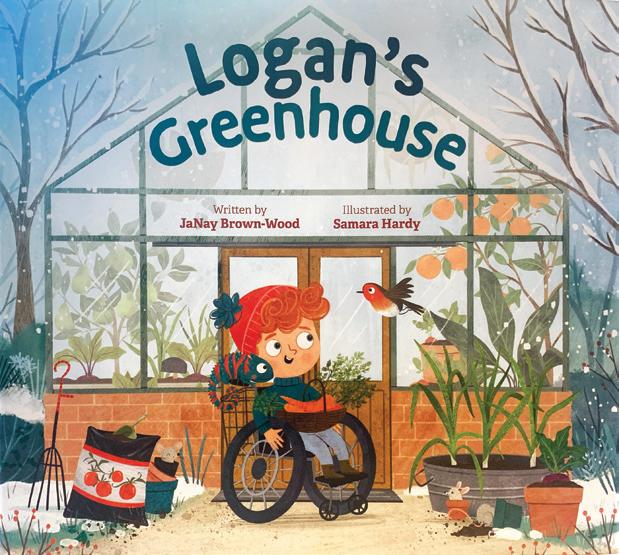



This year’s annual Agriculture Literacy Week broke records while enriching children’s agricultural awareness and helping them make connections with farming.
More than 1,500 volunteers read to over 70,000 students during Virginia Agriculture in the Classroom’s annual Agriculture Literacy Week, March 18-22. Participants in the event read AITC’s 2024 Book of the Year, Logan’s Greenhouse by JaNay Brown-Wood, and donated more than 3,100 copies of the book to public and private schools, community clubs and local libraries.
“This was a record-breaking year with the most books donated so far,” said Tammy Maxey, AITC executive director. “Thanks to volunteers who dedicated their time to share agriculture’s story and donate books, thousands of children had an opportunity to connect with farming and learn why it’s so important to their communities.”
In addition to reading books during Agriculture Literacy Week, volunteers engaged children with the sources of their food and fiber through hands-on educational activities, demonstrations and Q&A sessions.
In Isle of Wight County, Virginia Cooperative Extension agents Tabatha Davis and Livvy Presser and program assistant Brandy Compton, along with partnering agricultural organizations, read to students at local
| BY ALICE KEMP
elementary schools. During the readings, they led energetic discussions about students’ favorite fruits and vegetables, how agriculture impacts their daily lives, and the role farmers play getting food from field to fork.
“Ag Literacy Week helps bridge the gap between farming and youth,” Compton said. “A lot of youth will never step foot on a farm. It’s incredibly important that children and future generations know that food just doesn’t appear at the grocery store—a lot of faith, stewardship and man hours are behind it all.”
Now in its 14th year, Agriculture Literacy Week is AITC’s largest educational event and provides a fun, interactive way to increase children’s knowledge of farming and the importance of where their food comes from.
Volunteer readers also included Virginia’s first lady, Suzanne Youngkin; Virginia Secretary of Agriculture and Forestry Matthew Lohr; Virginia Department of Agriculture and Consumer Services Commissioner Joseph Guthrie; members of Virginia’s legislature; county Farm Bureau leaders; employees of VDACS and Farm Credit; FFA and 4-H club members; and representatives of other agricultural organizations.
To learn more about Agriculture Literacy Week and how to support Virginia AITC, visit virginia.agclassroom.org.

It’s not just for breakfast anymore

Toast is the perfect culinary base for a variety of sweet and savory spreads, fruit, meat and other toppings—like the arugula and egg shown here.




Toast is trending in the kitchen. Going beyond butter and jam, cooks are revolutionizing their crusty bread with delicious toppings enjoyed as a quick snack or a filling meal.
From hearty whole grain or rustic sourdough to a classic Italian, the bread sets the stage for a toasty masterpiece. A good quality loaf sliced thick can support plenty of ingredients and ensure a substantial bite. Sweet and savory spreads like cheese, custard, hummus, nut butter, Nutella, smashed avocado and more make great bases for pairing with countless complimentary toppings.
Set yourself up for toast success by gathering your ingredients and preparing toppings in advance. If using eggs, frying and scrambling can be done while the bread is toasting to ensure they stay warm. Avoid soggy bread by sautéing greens like spinach and patting dry before topping the toast.
INGREDIENTS
2 tablespoons lemon juice
4 ounces softened goat cheese
4 1”-thick slices of sturdy bread, toasted
4 eggs
1 tablespoon white vinegar, optional arugula for topping
crushed red pepper to taste
DIRECTIONS
In a mixing bowl, combine lemon juice and goat cheese. Spread on toast.
Poach the eggs by bringing a medium pot of water to a gentle boil. Add the vinegar, and stir the water so it moves in a circular
motion. One at a time, crack each egg into a small bowl and gently slip the egg into the water. Give the water one more gentle stir, and cook 3½-4 minutes. Scoop the eggs out with a slotted spoon, and test for doneness. Pat the egg dry to remove any excess water.
Top each slice of toast with arugula and a poached egg, and sprinkle with red pepper.
—Recipe adapted from Virginia Egg Council
INGREDIENTS
1 cup small-curd cottage cheese
4 slices multigrain bread, toasted
salt and pepper to taste
12 slices seedless cucumber
8 ounces smoked salmon, sliced thin
¼ cup red onion, finely chopped (optional)
4 teaspoons capers, drained
dill sprigs, snipped
2 small tomatoes, sliced
DIRECTIONS
Spread ¼ cup of cottage cheese on each slice of toast, and sprinkle with salt and pepper. Add the cucumber and salmon, and sprinkle with onion, if using, capers and dill. Serve with tomatoes.
—Recipe adapted from U.S. Dairy


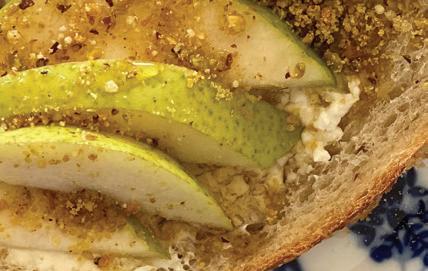




INGREDIENTS
2 slices sourdough bread
4 tablespoons ricotta cheese
1 ripe Anjou pear, sliced thin
2 tablespoons crushed pistachios
2 teaspoons honey
DIRECTIONS
Toast the bread. Spread the ricotta cheese on the toast, and add the sliced pears. Sprinkle with crushed pistachios, and drizzle with honey.
—Recipe adapted from USA Pears, Molly Knauer
INGREDIENTS
1¾ pounds boneless chuck short ribs
½ cup prepared roasted tomato salsa
2 avocados, pitted
4 slices whole grain seedy bread, toasted
1 tomato, cut into 8 slices
1 lime, cut into 4 wedges
DIRECTIONS
Attach a sous vide wand to a stock pot.
Sous vide is a method of cooking in which food is sealed in plastic bags, then slowly cooked in water at low temperatures. Fill the pot with water according to the manufacturer’s instructions.
Heat the sous vide wand to 160°.
Place the beef and salsa in a foodsafe plastic bag and seal, removing as much air as possible. Submerge the bag in the water, and set a timer for 24 hours.
At the end of the cooking time, carefully remove the bag from the pot, open it and pour 1 cup of cooking liquid into a small bowl. Remove the ribs, and discard the bag. Shred the beef with two forks. Remove the fat from the cooking liquid.
Remove the avocado flesh from its peel. Use a potato masher or fork to lightly smash the avocado to a spreadable consistency.
Divide the ingredients evenly and layer each piece of bread with the avocado spread, a tomato slice and shredded beef. Drizzle the cooking liquid over each serving. Season with salt and pepper. Serve with a wedge of lime.
—Recipe adapted from Beef. It’s What’s For Dinner.

BY CHRISTINA AMANO DOLAN
During the bustling months of fall, everyone on the road is in a hurry— leaving ample room for disaster.
Fall harvest season is one of the busiest and riskiest times of the year for farmers, as many are required to drive slow-moving farm equipment on public roadways to complete their harvest tasks.
“You’ll hear every farmer say, ‘I’ve got to get this done. I’ve got to get to the next thing,’” remarked Matt Nuckols, chair of the Virginia Farm Bureau Federation Farm Safety Advisory Committee.
But racing to get things done can compromise safety.
“Before you get on a piece of equipment and pull out on a road, think about what is most important,” he said.
“Yes, you’ve got to get your work done, but getting home every night to your loved ones—that is ultimately the most important thing.”
In 2022, workers in the agriculture, forestry, fishing and hunting industries had one of the highest fatal injury rates at about 18.6 deaths per 100,000 fulltime workers. Transportation incidents were the leading cause of death for farmers and farmworkers, according to the Centers for Disease Control and Prevention.
And with fewer storage facilities and mills, getting product harvested and to the market may mean more hours spent on the road—heightening the risk of roadway collisions.
Virginia law requires vehicles that
travel slower than 25 mph to be equipped with rear-mounted triangular slow-moving vehicle signs when the equipment is being driven on public roads. The reflective orange signs act as a warning to approaching drivers to slow down.
A car traveling 55 mph takes 5 seconds to brake 300 feet—the length of a football field—to avoid colliding with farm equipment traveling 15 mph.
Using flashing amber lights, reflective decals, safety lights and escort vehicles can help warn oncoming traffic. Farmers also should ensure SMV signs are visible, secure their loads, avoid moving equipment during peak traffic times when possible, and use hazard lights and turn signals diligently.



BY CHRISTINA AMANO DOLAN

With long hours, manually taxing labor, volatile working conditions and high rates of injury, farming comes with an extraordinary amount of strain—resulting in adverse rates of arthritis among agricultural workers.
According to the Centers for Disease Control and Prevention, about 53 million U.S. adults suffer from the disease. A 2022 Virginia Adult Health Survey found that 27.9% of Virginia adults are affected by arthritis. Some reports say 30% of Virginia farmers are affected by arthritis, usually osteoarthritis.
Because arthritis can cause pain and inflammation in joints and limit mobility, it can threaten a farmer’s livelihood when left untreated.
Arthritis can make daily activities painful and farm chores more cumbersome and increase the risk of injury. It also can lead to long-term consequences like joint destruction or disability, and negatively impact one’s mental health, noted Amy Johnson, family nurse practitioner and Virginia Farm Bureau Federation Farm Safety Advisory Committee member.
“It’s important to take care of yourself in order to continue to farm safely for many years into the future,” she said.
Hip and knee osteoarthritis are especially common among agricultural workers—primarily caused by severe injury of joints, repetitive motions and

stressful use of joints.
Johnson noted that “any tasks that require bending, stooping, kneeling and crawling” are especially hard on the hips and knees—like climbing on and off tractors, equipment and grain bins.
She advises using proper body mechanics when lifting and moving; maintaining a healthy body weight; exercising and stretching regularly; eating healthy; and keeping machinery in working order and workspaces clean to prevent injuries.
Johnson also encourages using knee pads, carts or stools when doing ground-level work; and handrails to avoid putting undue pressure on hips and knees.
Early diagnosis is key to successfully treating osteoarthritis, managing pain and sustaining life as a farmer.
Immediately consult a physician if you are experiencing:
• stiffness, swelling, clicking, locking or weakness in a joint;
• pain with movement that worsens throughout the day; or
• discomfort in a joint due to a change in weather.
A physician may first prescribe physical therapy, lifestyle modifications like weight loss or over-the-counter anti-inflammatory medications and acetaminophen. If those prove ineffective, prescription anti-inflammatory medications, steroid joint injections or cartilage supplementation may be considered.
“Surgery is always a last resort,” Johnson asserted.
Osteoarthritis patients also can manage joint pain by remaining physically active; applying topical anti-inflammatories and muscle rubs; eating a diet high in fruits, vegetables and healthy fats; using splints to prevent further damage; and avoiding overdoing daily activities.
Assistive technologies like anatomical splints and adding steps to tractors can help protect joints. For more information on assistive technologies, visit AgrAbility.org.
With a wealth of available treatment options and evolving assistive devices, Johnson believes that even those suffering from severe disease can continue to farm.
“This may require some degree of scaling down the operation, or conversations with family about transition of labor or sharing the workload,” she noted.
For additional resources for arthritis patients, visit Arthritis.org or AgriSafe.org For direct emotional support, advice and mental health resources from a trained professional, call or text the AgriStress Helpline at 833-897-2474—available 24 hours a day, 7 days a week.
